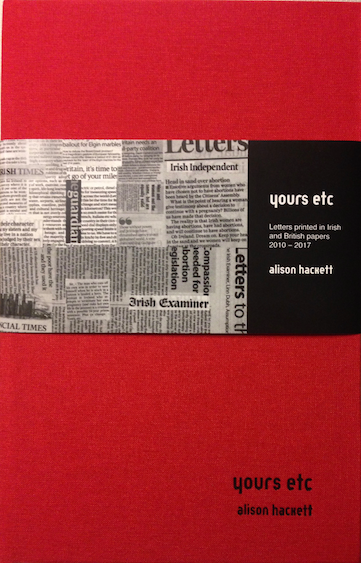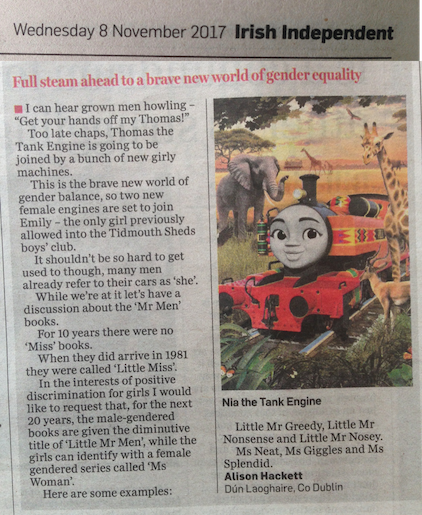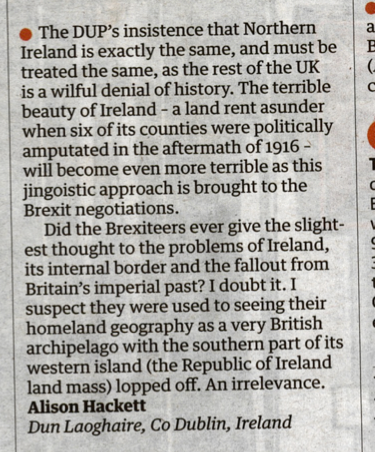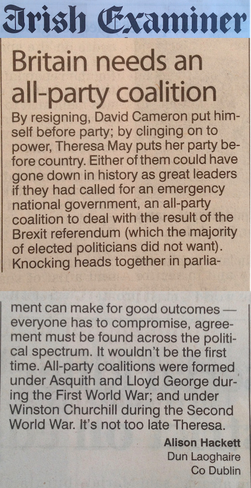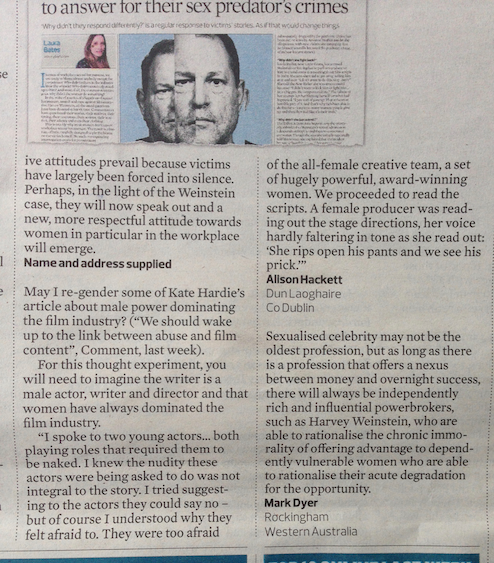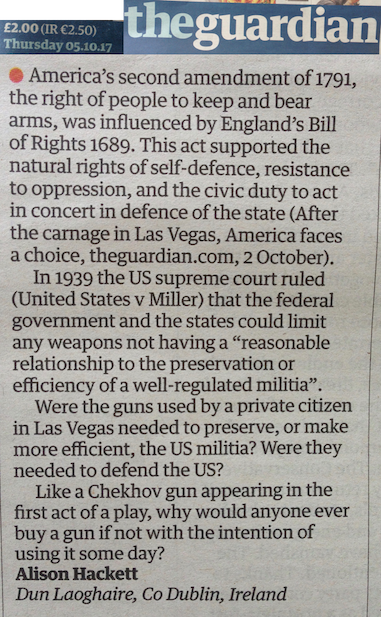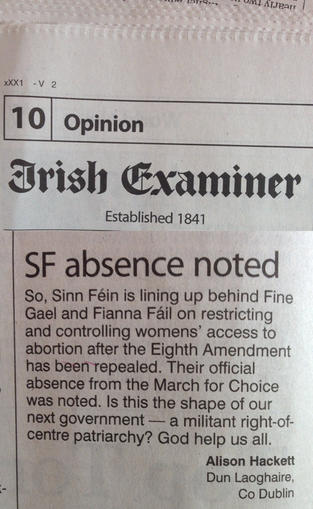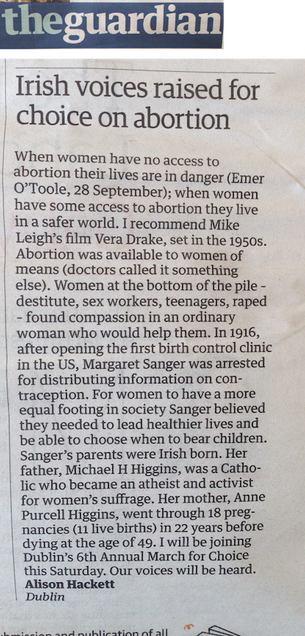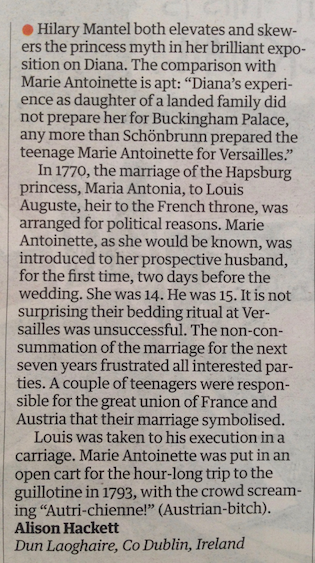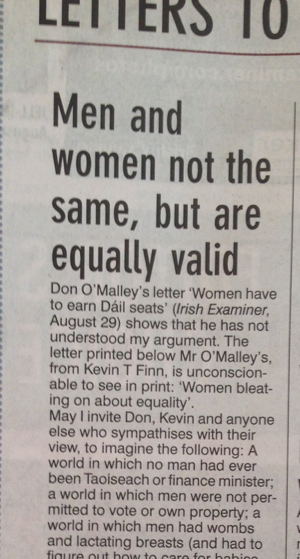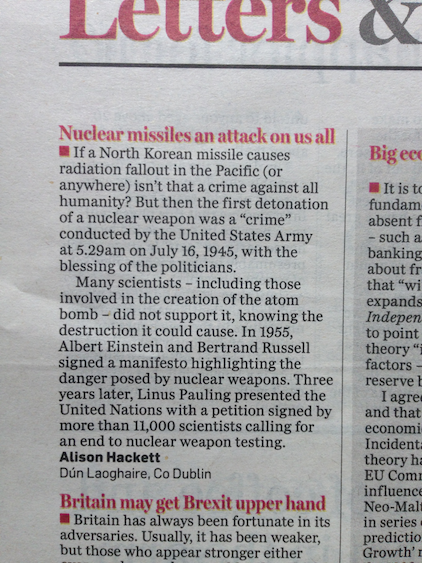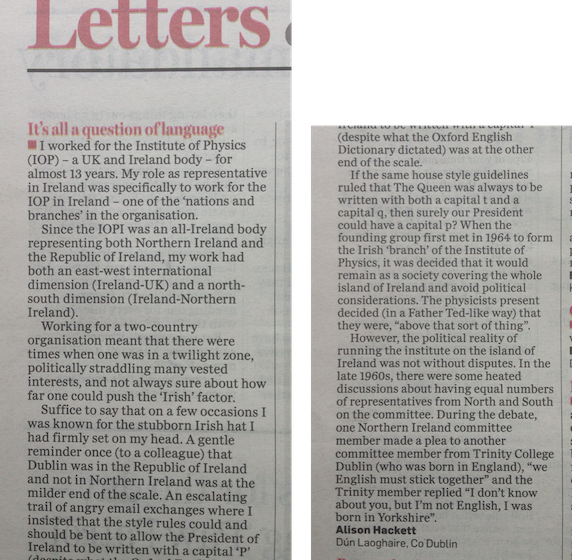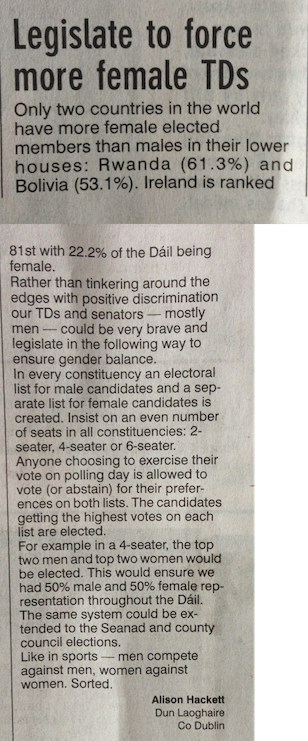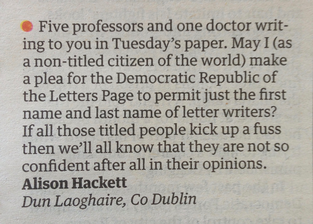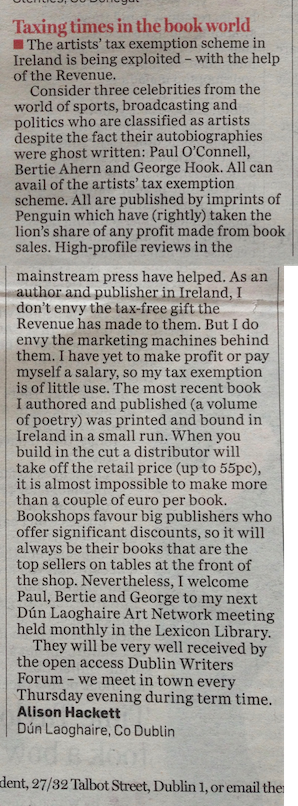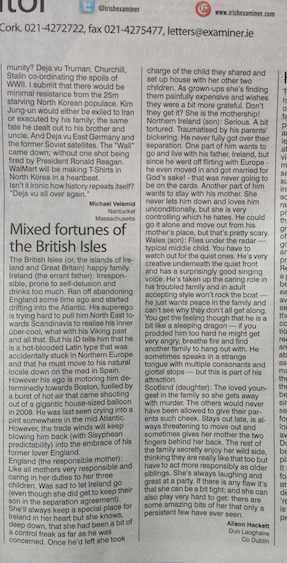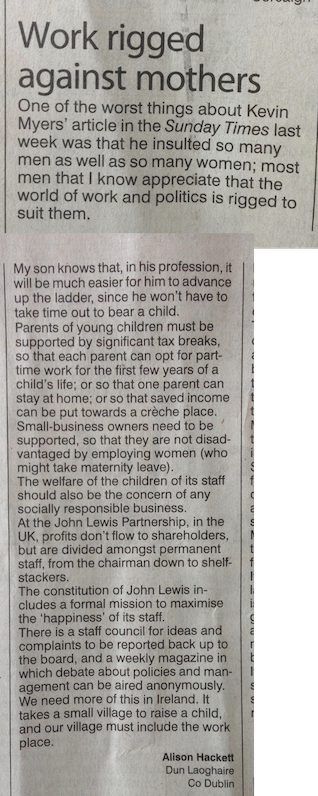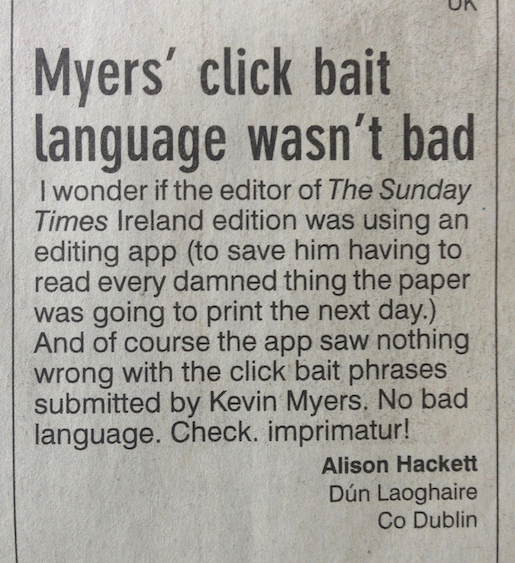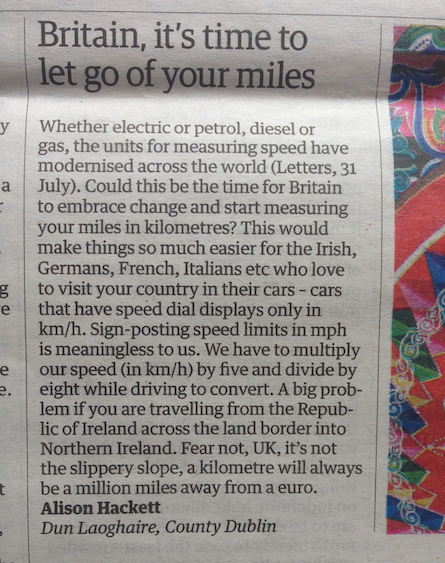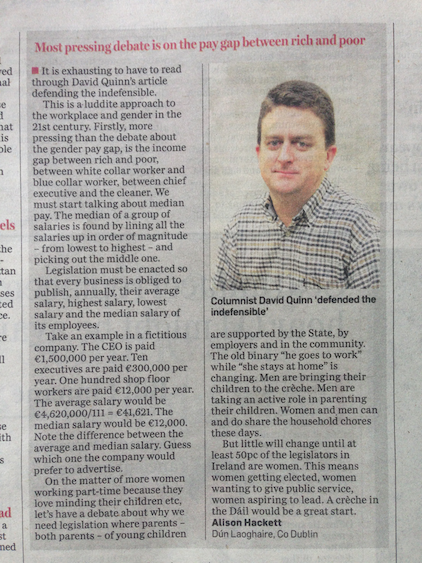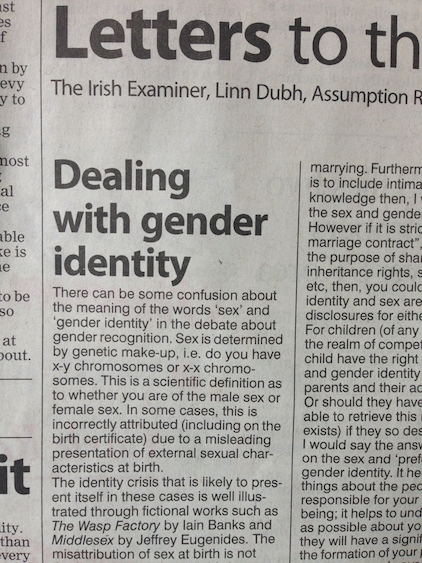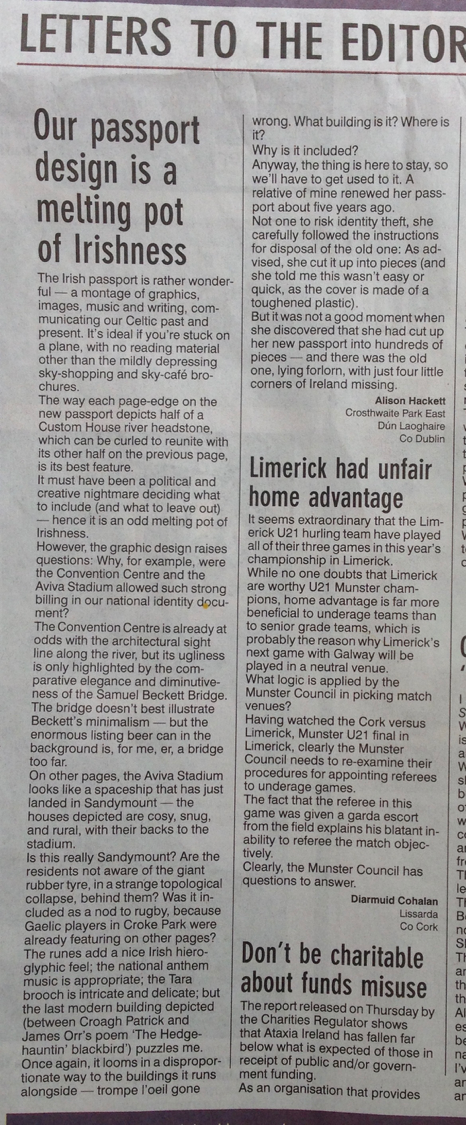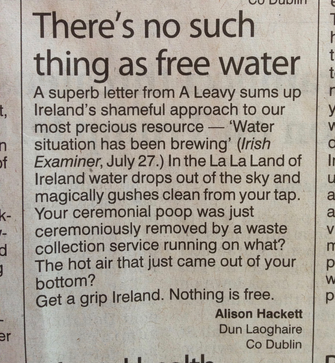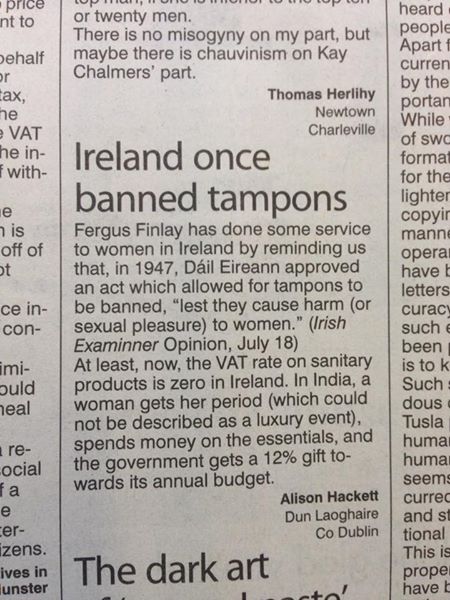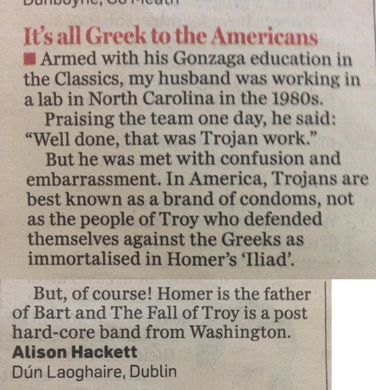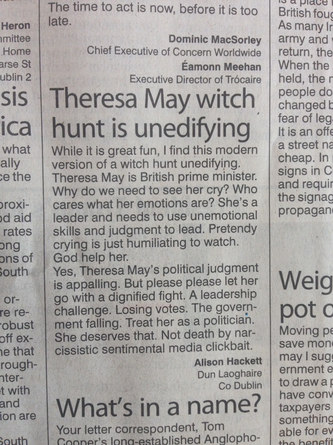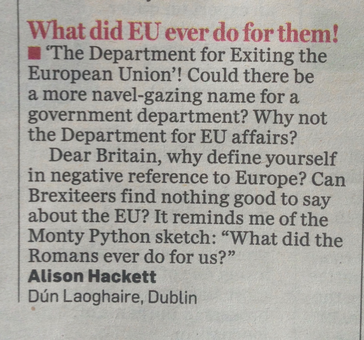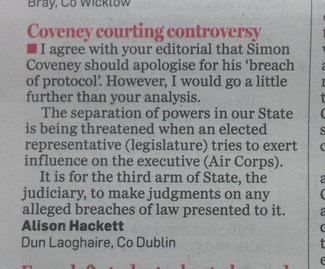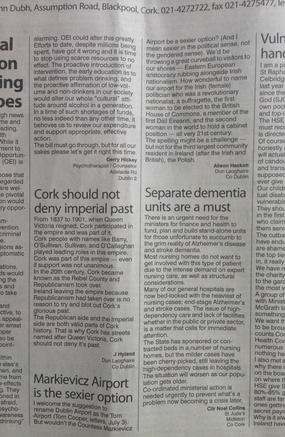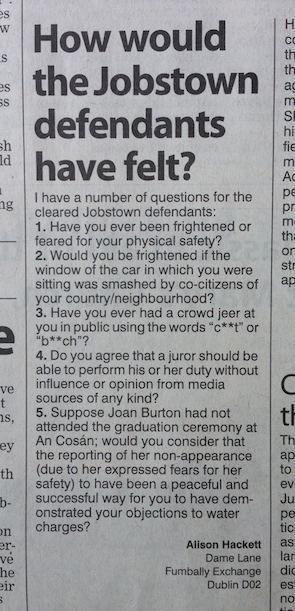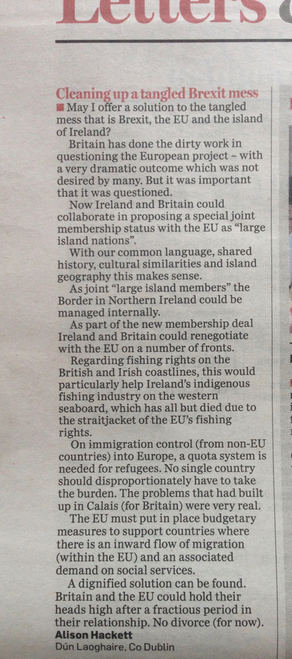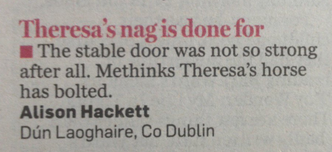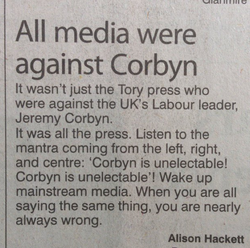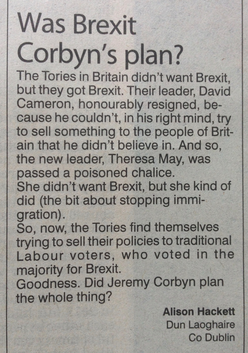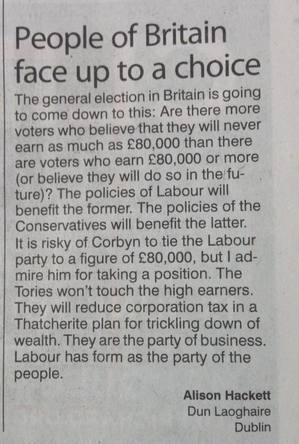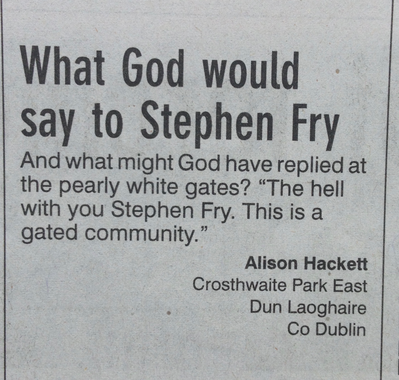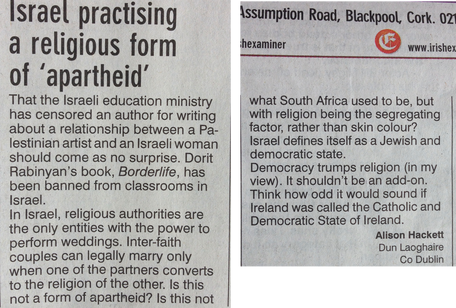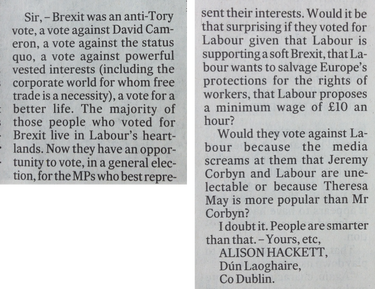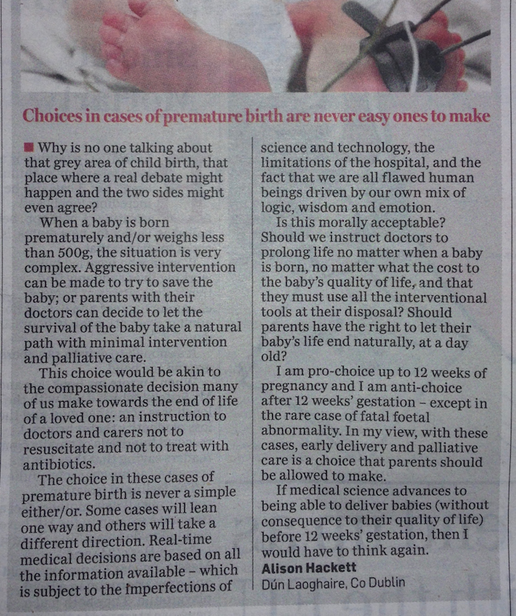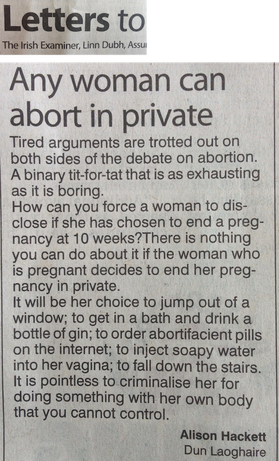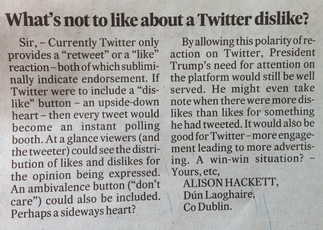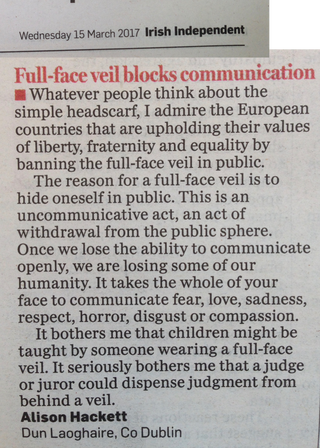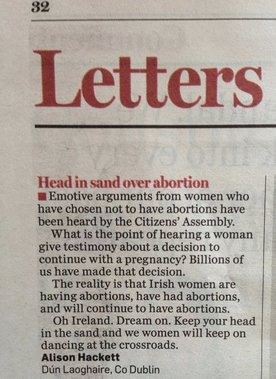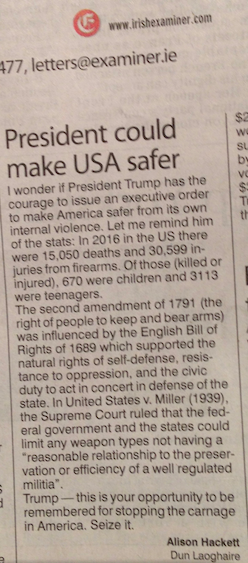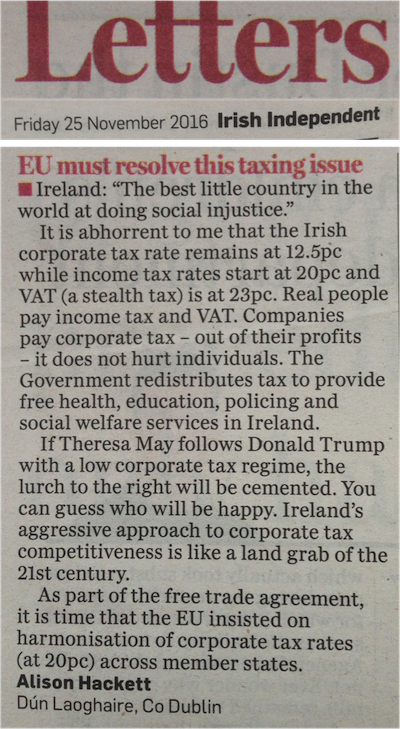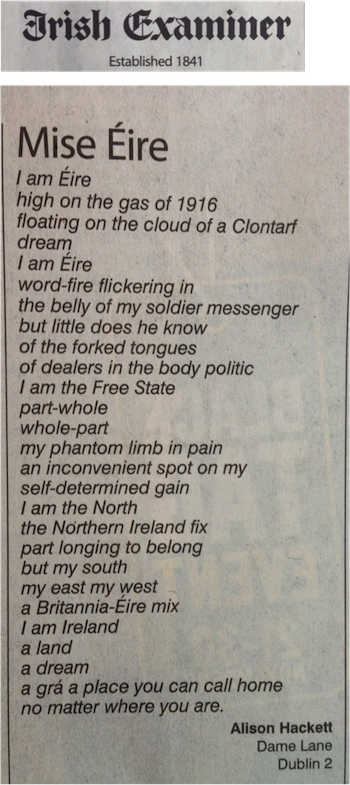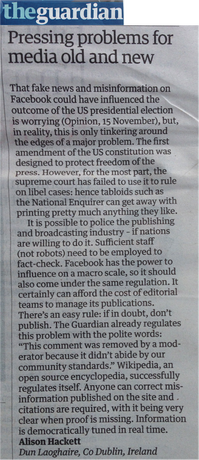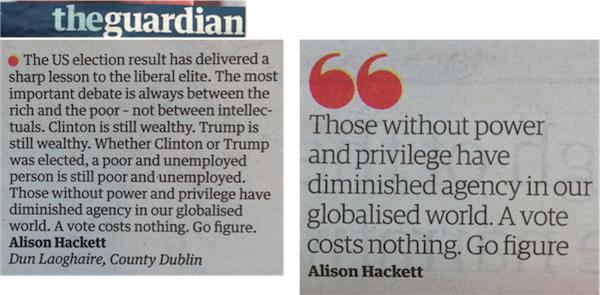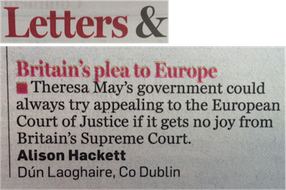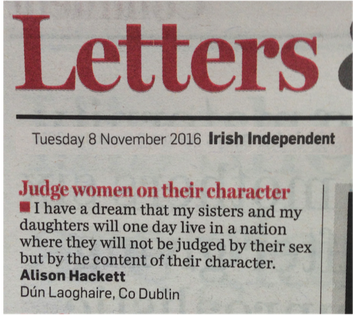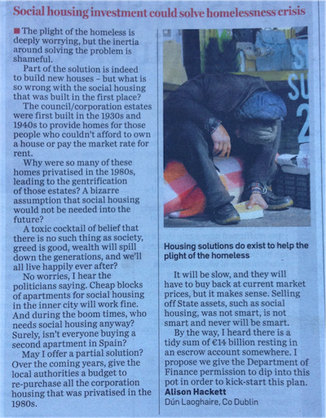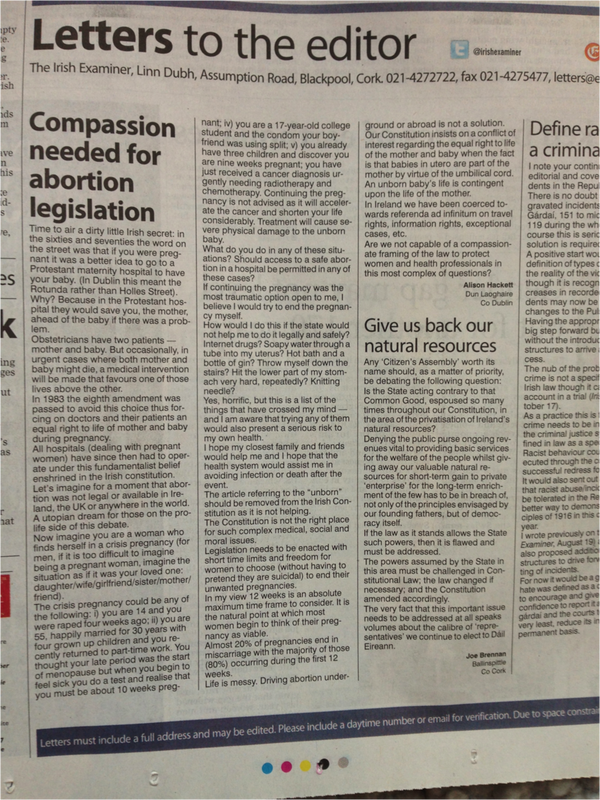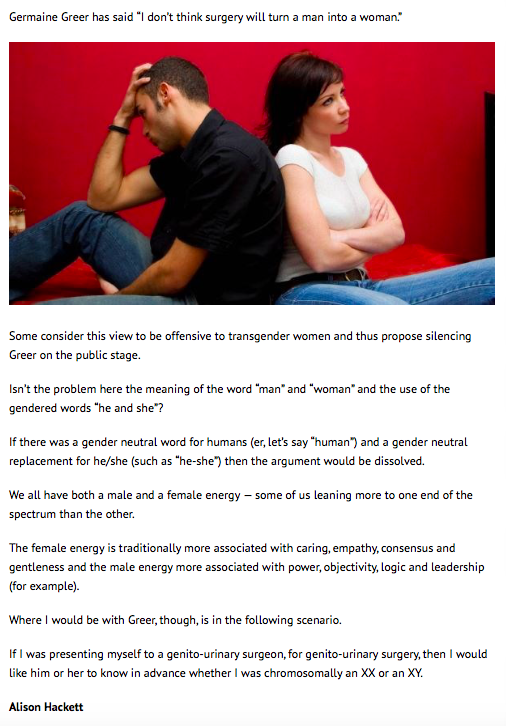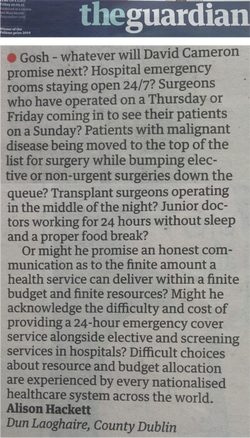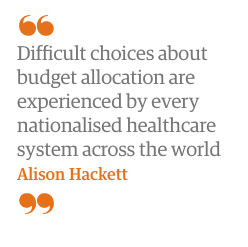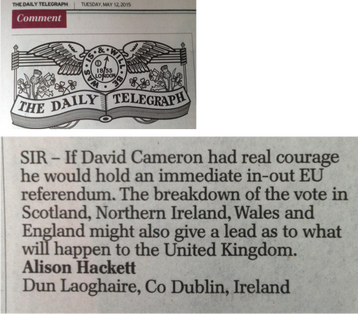LETTERS 2010 – 2017
I can hear grown men howling - “Get your hands off my Thomas!” Too late chaps, Thomas the Tank Engine is going to be joined by a bunch of new girly machines. This is the brave new world of gender balance, so two new female engines are set to join Emily – the only girl previously allowed into the Tidmouth Sheds boys' club.
It shouldn't be so hard to get used to though, many men already refer to their cars as ’she’.
While we’re at it let's have a discussion about the 'Mr Men' books. For ten years there were no ‘Miss' books. When they did arrive in 1981 they were called 'Little Miss'.
In the interests of positive discrimination for girls I would like to request that, for the next twenty years, the male-gendered books are given the diminutive title of 'Little Mr Men' while the girls can identify with a female gendered series called 'Ms Woman’. Here are some examples: Little Mr Greedy, Little Mr Nonsense and Little Mr Nosey.
Ms Neat, Ms Giggles and Ms Splendid.
Irish Independent 8 Nov 2017
It shouldn't be so hard to get used to though, many men already refer to their cars as ’she’.
While we’re at it let's have a discussion about the 'Mr Men' books. For ten years there were no ‘Miss' books. When they did arrive in 1981 they were called 'Little Miss'.
In the interests of positive discrimination for girls I would like to request that, for the next twenty years, the male-gendered books are given the diminutive title of 'Little Mr Men' while the girls can identify with a female gendered series called 'Ms Woman’. Here are some examples: Little Mr Greedy, Little Mr Nonsense and Little Mr Nosey.
Ms Neat, Ms Giggles and Ms Splendid.
Irish Independent 8 Nov 2017
Hearing the DUP’s Jeffrey Donaldson speaking on RTE radio today regarding Northern Ireland, Ireland and Brexit is incredibly depressing. His insistence that Northern Ireland is exactly the same, and must be treated the same, as the rest of the UK is a wilful denial of history. The terrible beauty of Ireland – a land rent asunder with six of its counties politically amputated in the aftermath of 1916 – will only become worse if such a jingoistic approach is brought to the Brexit negotiations.
Did the Brexiteers ever give the slightest thought to the problems of Ireland, its internal border and the fallout from Britain’s imperial past? I doubt it. I suspect they were used to seeing their homeland geography as a very British archipelago with the southern part of its north-western island (the Republic of Ireland) land mass lopped off. An irrelevance.
Printed Belfast Telegraph 14 Nov 2017 Irish Examiner 15 Nov 2017, The Guardian 20 Nov 2017
Did the Brexiteers ever give the slightest thought to the problems of Ireland, its internal border and the fallout from Britain’s imperial past? I doubt it. I suspect they were used to seeing their homeland geography as a very British archipelago with the southern part of its north-western island (the Republic of Ireland) land mass lopped off. An irrelevance.
Printed Belfast Telegraph 14 Nov 2017 Irish Examiner 15 Nov 2017, The Guardian 20 Nov 2017
By resigning David Cameron put himself before party; By clinging on to power Theresa May puts her party before country.
Either of them could have gone down in history as great leaders if they had called for an emergency national Government, an all-party coalition to deal with the result of the Brexit referendum (which the majority of elected politicians did not want). Knocking heads together in parliament can make for good outcomes - everyone has to compromise, agreement must be found across the political spectrum.
It wouldn’t be the first time. All-party coalitions were formed under Asquith and Lloyd George during the First World War; and under Winston Churchill during the Second World War. It’s not too late Theresa.
Printed Irish Examiner 25 Oct 2017
Either of them could have gone down in history as great leaders if they had called for an emergency national Government, an all-party coalition to deal with the result of the Brexit referendum (which the majority of elected politicians did not want). Knocking heads together in parliament can make for good outcomes - everyone has to compromise, agreement must be found across the political spectrum.
It wouldn’t be the first time. All-party coalitions were formed under Asquith and Lloyd George during the First World War; and under Winston Churchill during the Second World War. It’s not too late Theresa.
Printed Irish Examiner 25 Oct 2017
May I re-gender some of Kate Hardie’s article about male power dominating the film industry? (“We should wake up to the link between abuse and film content”, Comment).
For this thought experiment, you will need to imagine the writer is a male actor, writer and director and that women have always dominated the film industry.
“I spoke to two young actors… both playing roles that required them to be naked. I knew the nudity these actors were being asked to do was not integral to the story. I tried suggesting to the actors they could say no – but of course I understood why they felt afraid to. They were too afraid of the all-female creative team, a set of hugely powerful, award-winning women. We proceeded to read the scripts. A female producer was reading out the stage directions, her voice hardly faltering in tone as she read out: ‘She rips open his pants and we see his prick.’”
Printed The Observer 22 Oct 2017
For this thought experiment, you will need to imagine the writer is a male actor, writer and director and that women have always dominated the film industry.
“I spoke to two young actors… both playing roles that required them to be naked. I knew the nudity these actors were being asked to do was not integral to the story. I tried suggesting to the actors they could say no – but of course I understood why they felt afraid to. They were too afraid of the all-female creative team, a set of hugely powerful, award-winning women. We proceeded to read the scripts. A female producer was reading out the stage directions, her voice hardly faltering in tone as she read out: ‘She rips open his pants and we see his prick.’”
Printed The Observer 22 Oct 2017
America's second amendment of 1791, the right of people to keep and bear arms, was influenced by the 1689 English Bill of Rights. This act supported the natural rights of self-defence, resistance to oppression, and the civic duty to act in concert in defence of the state.
In 1939 the Supreme Court ruled (United States v Miller) that the federal government and the states could limit any weapon types not having a "reasonable relationship to the preservation or efficiency of a well- regulated militia".
Were the guns used by a private citizen in Las Vegas needed to preserve, or make more efficient, the US militia? Were they needed to defend the United States?
Like a Chekhov gun appearing in the first act of a play, why on earth would anyone ever buy a gun if not with the intention of using it some day in the future?
Printed The Guardian 5 Oct 2017
In 1939 the Supreme Court ruled (United States v Miller) that the federal government and the states could limit any weapon types not having a "reasonable relationship to the preservation or efficiency of a well- regulated militia".
Were the guns used by a private citizen in Las Vegas needed to preserve, or make more efficient, the US militia? Were they needed to defend the United States?
Like a Chekhov gun appearing in the first act of a play, why on earth would anyone ever buy a gun if not with the intention of using it some day in the future?
Printed The Guardian 5 Oct 2017
So, Sinn Féin is lining up behind Fine Gael and Fianna Fáil on restricting and controlling womens' access to abortion after the 8th amendment has been repealed. Their official absence from the March for Choice was noted.
Is this the shape of our next government - a militant right-of-centre patriarchy? God help us all.
Printed Irish Examiner 3 October 2017
Is this the shape of our next government - a militant right-of-centre patriarchy? God help us all.
Printed Irish Examiner 3 October 2017
Abortion-bad/abortion-good is a false dichotomy. When women have no access to abortion their lives are in danger; when women have some access to abortion (within a legal framework) they live in a safer world.
For anyone who considers themselves to have an open mind on this complex issue I recommend Mike Leigh’s film Vera Drake, set in the 1950s. “Abortion” was available to women of means (doctors called it something else). Women at the bottom of the pile – destitute; sex workers; teenagers; raped – found compassion in a woman who would help them end their pregnancies when they found themselves facing a brick wall.
In 1916, after opening the first birth control clinic in the US, Margaret Sanger was arrested for distributing information on contraception. For women to have a more equal footing in society Sanger believed they needed to lead healthier lives and be able to choose when to bear children. She also wanted to prevent, as far as possible, so called back-alley abortions.
Sanger’s parents were Irish born. Her father, Michael H. Higgins, was a Catholic who became an atheist and activist for women's suffrage. Her mother, Anne Purcell Higgins, went through 18 pregnancies (11 live births) in 22 years before dying at the age of 49.
I will be joining the 6th Annual March for Choice this Saturday the 30th of September, assembling at the Garden of Remembrance on Parnell Square in Dublin from 1.30pm, before we march on Dáil Éireann at 2pm. Our voices will be heard.
Printed Irish Examiner 28 Oct 2017, The Guardian 29 Oct 2017
For anyone who considers themselves to have an open mind on this complex issue I recommend Mike Leigh’s film Vera Drake, set in the 1950s. “Abortion” was available to women of means (doctors called it something else). Women at the bottom of the pile – destitute; sex workers; teenagers; raped – found compassion in a woman who would help them end their pregnancies when they found themselves facing a brick wall.
In 1916, after opening the first birth control clinic in the US, Margaret Sanger was arrested for distributing information on contraception. For women to have a more equal footing in society Sanger believed they needed to lead healthier lives and be able to choose when to bear children. She also wanted to prevent, as far as possible, so called back-alley abortions.
Sanger’s parents were Irish born. Her father, Michael H. Higgins, was a Catholic who became an atheist and activist for women's suffrage. Her mother, Anne Purcell Higgins, went through 18 pregnancies (11 live births) in 22 years before dying at the age of 49.
I will be joining the 6th Annual March for Choice this Saturday the 30th of September, assembling at the Garden of Remembrance on Parnell Square in Dublin from 1.30pm, before we march on Dáil Éireann at 2pm. Our voices will be heard.
Printed Irish Examiner 28 Oct 2017, The Guardian 29 Oct 2017
Hilary Mantel both elevates and skewers the princess myth in her brilliant exposition on Diana, the people’s princess
The comparison with Marie Antoinette is apt: “Diana’s experience as daughter of a landed family did not prepare her for Buckingham Palace, any more than Schönbrunn prepared the teenage Marie Antoinette for Versailles.”
In 1770, the marriage of the Hapsburg princess, Maria Antonia, to Louis Auguste, heir to the French throne, was arranged for political reasons. Marie Antoinette, as she would thenceforth be known, was introduced to her prospective husband, for the first time, two days before the wedding.
She was fourteen. He was fifteen and shy. It is not surprising that their bedding ritual at Versailles was observed to be unsuccessful. The non-consummation of the marriage for the next seven years frustrated all interested parties. A couple of teenagers were responsible for the great union of France and Austria that their marriage symbolized. It had to work. This was politics.
The ex-King Louis XVI was taken to his execution in a carriage. Marie Antoinette was put in an open cart for the hour-long trip to the guillotine in Place de la Révolution on the 16th October 1793. Aged thirty-seven, in a white dress, hair shorn, hands tied behind her back and on a leash, she could hear the crowd screaming “Autri-chienne!" (Austrian-bitch).
Printed The Guardian 2 Sept 2017
The comparison with Marie Antoinette is apt: “Diana’s experience as daughter of a landed family did not prepare her for Buckingham Palace, any more than Schönbrunn prepared the teenage Marie Antoinette for Versailles.”
In 1770, the marriage of the Hapsburg princess, Maria Antonia, to Louis Auguste, heir to the French throne, was arranged for political reasons. Marie Antoinette, as she would thenceforth be known, was introduced to her prospective husband, for the first time, two days before the wedding.
She was fourteen. He was fifteen and shy. It is not surprising that their bedding ritual at Versailles was observed to be unsuccessful. The non-consummation of the marriage for the next seven years frustrated all interested parties. A couple of teenagers were responsible for the great union of France and Austria that their marriage symbolized. It had to work. This was politics.
The ex-King Louis XVI was taken to his execution in a carriage. Marie Antoinette was put in an open cart for the hour-long trip to the guillotine in Place de la Révolution on the 16th October 1793. Aged thirty-seven, in a white dress, hair shorn, hands tied behind her back and on a leash, she could hear the crowd screaming “Autri-chienne!" (Austrian-bitch).
Printed The Guardian 2 Sept 2017
Don O’Malley’s hysterical letter today (Women have to earn Dáil seats) shows that he has not understood my argument. The letter printed below Mr O’Malley’s, from Kevin T Finn, is unconscionable to see in print: women must stop “bleating on about female inequality”.
May I invite Don, Kevin and anyone else who sympathises with their view, to imagine the following world: a world in which no man had ever been Taoiseach or Minister for Finance; a world in which men were not permitted to vote or own property; a world in which men had wombs and lactating breasts (and had to figure out how to care for babies once they were born having been impregnated by women); a world in which our third arm of democracy, the legislature, was perpetually imbalanced with nearly 80% of the legislators being women.
I don’t seek equality for men and women – I don’t believe we are equal. We have a different set of drivers in our emotional, social and physical core. But we are no less valid than men. For this very reason, and because we will (I hope) always be close to forming 50% of the population (unlike ginger-haired people), we deserve a fair crack of the whip.
Why does Don think that a women’s competition and a man’s competition is needed in tennis and rugby? I suspect he will tell me it is because women are the weaker sex and should only compete against other women. Quite so. We are weaker physically. But we are not weaker either intellectually or emotionally.
As for the toilets that Kevin Finn is so bothered about? All toilets should be converted to facilitate both men and women with cubicles. The end of the urinal will be no loss to humanity.
Printed Irish Examiner 2 Sept 2017
May I invite Don, Kevin and anyone else who sympathises with their view, to imagine the following world: a world in which no man had ever been Taoiseach or Minister for Finance; a world in which men were not permitted to vote or own property; a world in which men had wombs and lactating breasts (and had to figure out how to care for babies once they were born having been impregnated by women); a world in which our third arm of democracy, the legislature, was perpetually imbalanced with nearly 80% of the legislators being women.
I don’t seek equality for men and women – I don’t believe we are equal. We have a different set of drivers in our emotional, social and physical core. But we are no less valid than men. For this very reason, and because we will (I hope) always be close to forming 50% of the population (unlike ginger-haired people), we deserve a fair crack of the whip.
Why does Don think that a women’s competition and a man’s competition is needed in tennis and rugby? I suspect he will tell me it is because women are the weaker sex and should only compete against other women. Quite so. We are weaker physically. But we are not weaker either intellectually or emotionally.
As for the toilets that Kevin Finn is so bothered about? All toilets should be converted to facilitate both men and women with cubicles. The end of the urinal will be no loss to humanity.
Printed Irish Examiner 2 Sept 2017
If a North Korean missile causes radiation fallout in the Pacific (or anywhere on the planet) isn't that a crime against all of humanity? But then the first detonation of a nuclear weapon was a crime conducted by the United States Army at 5:29 a.m. on July 16th, 1945, with the blessing of the politicians.
Many scientists – including those involved in the creation of the atom bomb - did not support it, knowing the destruction it could cause. In 1955 Albert Einstein and Bertrand Russell signed a manifesto highlighting the danger posed by nuclear weapons. Three years later Linus Pauling presented the United Nations with a petition signed by more than 11,000 scientists calling for an end to nuclear weapon testing.
Printed Irish Independent 30 August 2017 Irish Examiner 31 August
Many scientists – including those involved in the creation of the atom bomb - did not support it, knowing the destruction it could cause. In 1955 Albert Einstein and Bertrand Russell signed a manifesto highlighting the danger posed by nuclear weapons. Three years later Linus Pauling presented the United Nations with a petition signed by more than 11,000 scientists calling for an end to nuclear weapon testing.
Printed Irish Independent 30 August 2017 Irish Examiner 31 August
I worked for the Institute of Physics - a UK and Ireland body – for almost thirteen years. My role as Representative in Ireland was specifically to work for the IOP in Ireland - one of the ‘nations and branches’ in the organisation. Since the IOPI was an all-Ireland body representing both Northern Ireland and the Republic of Ireland, my work had both an east-west international dimension (Ireland-UK) and a north-south dimension (Ireland-Northern Ireland).
Working for a two-country organisation meant that there were times when one was in a twilight zone, politically straddling many vested interests, and not always sure about how far one could push the ‘Irish’ factor. Suffice to say that on a few occasions I was known for the stubborn Irish hat I had firmly set on my head. A gentle reminder once (to a colleague) that Dublin was in the Republic of Ireland and not in Northern Ireland was at the milder end of the scale.
An escalating trail of angry email exchanges where I insisted that the style rules could and should be bent to allow the President of Ireland to be written with a capital ‘P’ (despite what the Oxford English Dictionary dictated) was at the other end of the scale. If the same house style guidelines ruled that The Queen was always to be written with both a capital t and a capital q – then surely our president could have a capital p?
When the founding group first met in 1964 to form the Irish ‘branch’ of the Institute of Physics, it was decided that it would remain as a society covering the whole island of Ireland and avoid political considerations. The physicists present decided (in a Father Ted like way) that they were, “above that sort of thing.” However the political reality of running the institute on the island of Ireland was not without disputes. In the late sixties there were some heated discussions about having equal numbers of representatives from north and south on the committee.
During the debate one Northern Ireland committee member made a plea to another committee member from Trinity College Dublin (who was born in England), ‘We English must stick together’ and the Trinity member replied ‘I don’t know about you, but I’m not English I was born in Yorkshire!’
Printed Irish Independent 29 August 2017
Working for a two-country organisation meant that there were times when one was in a twilight zone, politically straddling many vested interests, and not always sure about how far one could push the ‘Irish’ factor. Suffice to say that on a few occasions I was known for the stubborn Irish hat I had firmly set on my head. A gentle reminder once (to a colleague) that Dublin was in the Republic of Ireland and not in Northern Ireland was at the milder end of the scale.
An escalating trail of angry email exchanges where I insisted that the style rules could and should be bent to allow the President of Ireland to be written with a capital ‘P’ (despite what the Oxford English Dictionary dictated) was at the other end of the scale. If the same house style guidelines ruled that The Queen was always to be written with both a capital t and a capital q – then surely our president could have a capital p?
When the founding group first met in 1964 to form the Irish ‘branch’ of the Institute of Physics, it was decided that it would remain as a society covering the whole island of Ireland and avoid political considerations. The physicists present decided (in a Father Ted like way) that they were, “above that sort of thing.” However the political reality of running the institute on the island of Ireland was not without disputes. In the late sixties there were some heated discussions about having equal numbers of representatives from north and south on the committee.
During the debate one Northern Ireland committee member made a plea to another committee member from Trinity College Dublin (who was born in England), ‘We English must stick together’ and the Trinity member replied ‘I don’t know about you, but I’m not English I was born in Yorkshire!’
Printed Irish Independent 29 August 2017
Only two countries in the world have more female elected members than males in their lower houses: Rwanda (61.3pc) and Bolivia (53.1pc). Ireland is ranked 81st with 22.2pc of the Dáil being female.
Rather than tinkering around the edges with positive discrimination our TDs and senators - mostly men - could be very brave and legislate in the following way to ensure gender balance after the next election.
In every constituency an electoral list for male candidates and a separate list for female candidates is created. Insist on an even number of seats in all constituencies: 2-seater, 4-seater or 6-seater.
Anyone choosing to exercise their vote on polling day is allowed to vote (or abstain) for their preferences on both lists. The candidates getting the highest votes (including transfers etc) on each list are elected. For example in a 4-seater, the top two men and top two women would be elected. This would ensure we had 50pc male and 50pc female representation throughout the Dáil. The same system could be extended to the Seanad and county council elections.
Like in sports - men compete against men, women against women. Sorted.
Printed Irish Examiner 26 August 2017
Rather than tinkering around the edges with positive discrimination our TDs and senators - mostly men - could be very brave and legislate in the following way to ensure gender balance after the next election.
In every constituency an electoral list for male candidates and a separate list for female candidates is created. Insist on an even number of seats in all constituencies: 2-seater, 4-seater or 6-seater.
Anyone choosing to exercise their vote on polling day is allowed to vote (or abstain) for their preferences on both lists. The candidates getting the highest votes (including transfers etc) on each list are elected. For example in a 4-seater, the top two men and top two women would be elected. This would ensure we had 50pc male and 50pc female representation throughout the Dáil. The same system could be extended to the Seanad and county council elections.
Like in sports - men compete against men, women against women. Sorted.
Printed Irish Examiner 26 August 2017
Five professors and one doctor writing to you in today's paper! May I (as a non titled Citizen of the World) make a plea for the Democratic Republic of the Letters Page to permit just the first name and last name of letter writers? If all those titled people kick up a fuss then we’ll all know that they are not so confident after all in their opinion.
Printed The Guardian 18 Aug 2017
Printed The Guardian 18 Aug 2017
The artists’ tax exemption scheme in Ireland is being exploited - with the help of the revenue. Consider three celebrities from the world of sports, broadcasting and politics who are classified as artists despite the fact that their autobiographies were ghost written: Paul O’Connell, Bertie Ahern and George Hook. All three can avail of the artists' tax exemption scheme. All three are published by imprints of Penguin which have (rightly) taken the lion’s share of any profit made from book sales. High profile reviews in the mainstream press undoubtedly will have helped.
As an author and publisher in Ireland I don’t envy the tax free gift the revenue has made to these three. But I do envy the marketing machines behind them. I have yet to make profit or pay myself a salary so my tax exemption is of little use. The most recent book I authored and published (a volume of poetry) was printed and bound in Ireland in a small run. When you build in the cut a distributer will take off the retail price (up to 55%) it is almost impossible to make more than a couple of euro per book. Bookshops favour the big publishers who offer significant discounts, so it will always be their books that are the top sellers on the tables at the front of the shop. The book trade doesn’t escape the effects of survival-of-the-fittest Darwinian capitalism.
Nevertheless I welcome Paul, Bertie and George to my next Dun Laoghaire Art Network meeting held monthly in the Lexicon Library. And they will be very well received by the open access Dublin Writers Forum led by the poets Anne Tannam and Fióna Bolger – we meet in town every Thursday evening during term time. Of course, Alan English, Richard Aldous and Paul Howard are very welcome too.
Printed Irish Independent 16 Aug 2017
As an author and publisher in Ireland I don’t envy the tax free gift the revenue has made to these three. But I do envy the marketing machines behind them. I have yet to make profit or pay myself a salary so my tax exemption is of little use. The most recent book I authored and published (a volume of poetry) was printed and bound in Ireland in a small run. When you build in the cut a distributer will take off the retail price (up to 55%) it is almost impossible to make more than a couple of euro per book. Bookshops favour the big publishers who offer significant discounts, so it will always be their books that are the top sellers on the tables at the front of the shop. The book trade doesn’t escape the effects of survival-of-the-fittest Darwinian capitalism.
Nevertheless I welcome Paul, Bertie and George to my next Dun Laoghaire Art Network meeting held monthly in the Lexicon Library. And they will be very well received by the open access Dublin Writers Forum led by the poets Anne Tannam and Fióna Bolger – we meet in town every Thursday evening during term time. Of course, Alan English, Richard Aldous and Paul Howard are very welcome too.
Printed Irish Independent 16 Aug 2017
The British Isles (or, the islands of Ireland and Great Britain) happy family
Ireland (the errant father): Irresponsible, prone to self-delusion and drinks too much. Ran off abandoning England some time ago and started drifting into the Atlantic. His superego is trying hard to pull him North East towards Scandinavia to realize his inner über-cool, what with his Viking past and all that. But his id tells him that he is a hot-blooded Latin type that was accidentally stuck in Northern Europe and that he must move to his natural locale down on the med in Spain. However his ego is motoring him determinedly towards Boston, fuelled by a burst of hot air that came shooting out of a gigantic house sized balloon in 2008. He was last seen crying into a pint somewhere in the mid Atlantic. However, the trade winds will keep blowing him back (with Sisyphean predictability) into the embrace of his former lover England.
England (the responsible mother): Like all mothers very responsible and caring in her duties to her three children. Was sad to let Ireland go (even though she did get to keep their son in the separation agreement). She’ll always keep a special place for Ireland in her heart but she knows, deep down, that she had been a bit of a control freak as far as he was concerned. Once he’d left she took charge of the child they shared and set up house with her other two children. As grown-ups she’s finding them painfully expensive and wishes they were a bit more grateful. Don’t they get it? She is the mothership!
Northern Ireland: Serious. A bit tortured. Traumatised by his parents’ bickering. He never fully got over their separation. One part of him wants to go and live with his father, Ireland, but since he went off flirting with Europe (he even moved in and got married for God’s sake!) that was never going to be on the cards. Another part of him wants to stay with his mother. She never lets him down and loves him unconditionally, but she is very controlling which he hates. He could go it alone and move out from his mother’s place, but that’s pretty scary. No-one understands him.
Wales: Flies under the radar – typical middle child. You have to watch out for the quiet ones. He’s very creative underneath the quiet front and has a surprisingly good singing voice. He’s taken up the caring role in his troubled family and in adult accepting style won’t rock the boat – he just wants peace in the family and can’t see why they don’t all get along. You get the feeling though that he is a bit like a sleeping dragon - if you prodded him too hard he might get very angry, breathe fire and find another family to hang out with. He sometimes speaks in a strange tongue with multiple consonants and glottal stops – but this is part of his attraction.
Scotland: The loved youngest in the family so she gets away with murder. The others would never have been allowed to give their parents such cheek. Stays out late, is always threatening to move out and sometimes gives her mother the two fingers behind her back. The rest of the family secretly enjoy her wild side, thinking they are really like that too but have to act more responsibly as older siblings. She’s always laughing and great at a party. If there is any flaw it’s that she can be a bit tight; and she can also play very hard to get: there are some amazing bits of her that only a persistent few have ever seen.
Printed Irish Examiner 14 August 2017 also posted as a blog in Sept 2014
Ireland (the errant father): Irresponsible, prone to self-delusion and drinks too much. Ran off abandoning England some time ago and started drifting into the Atlantic. His superego is trying hard to pull him North East towards Scandinavia to realize his inner über-cool, what with his Viking past and all that. But his id tells him that he is a hot-blooded Latin type that was accidentally stuck in Northern Europe and that he must move to his natural locale down on the med in Spain. However his ego is motoring him determinedly towards Boston, fuelled by a burst of hot air that came shooting out of a gigantic house sized balloon in 2008. He was last seen crying into a pint somewhere in the mid Atlantic. However, the trade winds will keep blowing him back (with Sisyphean predictability) into the embrace of his former lover England.
England (the responsible mother): Like all mothers very responsible and caring in her duties to her three children. Was sad to let Ireland go (even though she did get to keep their son in the separation agreement). She’ll always keep a special place for Ireland in her heart but she knows, deep down, that she had been a bit of a control freak as far as he was concerned. Once he’d left she took charge of the child they shared and set up house with her other two children. As grown-ups she’s finding them painfully expensive and wishes they were a bit more grateful. Don’t they get it? She is the mothership!
Northern Ireland: Serious. A bit tortured. Traumatised by his parents’ bickering. He never fully got over their separation. One part of him wants to go and live with his father, Ireland, but since he went off flirting with Europe (he even moved in and got married for God’s sake!) that was never going to be on the cards. Another part of him wants to stay with his mother. She never lets him down and loves him unconditionally, but she is very controlling which he hates. He could go it alone and move out from his mother’s place, but that’s pretty scary. No-one understands him.
Wales: Flies under the radar – typical middle child. You have to watch out for the quiet ones. He’s very creative underneath the quiet front and has a surprisingly good singing voice. He’s taken up the caring role in his troubled family and in adult accepting style won’t rock the boat – he just wants peace in the family and can’t see why they don’t all get along. You get the feeling though that he is a bit like a sleeping dragon - if you prodded him too hard he might get very angry, breathe fire and find another family to hang out with. He sometimes speaks in a strange tongue with multiple consonants and glottal stops – but this is part of his attraction.
Scotland: The loved youngest in the family so she gets away with murder. The others would never have been allowed to give their parents such cheek. Stays out late, is always threatening to move out and sometimes gives her mother the two fingers behind her back. The rest of the family secretly enjoy her wild side, thinking they are really like that too but have to act more responsibly as older siblings. She’s always laughing and great at a party. If there is any flaw it’s that she can be a bit tight; and she can also play very hard to get: there are some amazing bits of her that only a persistent few have ever seen.
Printed Irish Examiner 14 August 2017 also posted as a blog in Sept 2014
One of the worst things about Kevin Myers’ article in the Sunday Times is that he insulted so many men as well as women; most men I know appreciate that the world of work and politics is rigged to suit them. I have a son who is well aware that in his profession it will be much easier for him to advance up the ladder since he won’t ever have to take time out to bear a child.
Parents of young children must be supported by significant tax breaks so that each parent could opt for part-time work for the first few years of a childs life; or one parent could stay at home; or saved income could be put towards a crèche place. Small business employers need more support so that they are not disadvantaged when employing women (who might take maternity leave). The welfare of the children of its staff should also be the concern of any socially responsible business.
The John Lewis Partnership in the UK is an employee-owned partnership model where profits don’t flow to shareholders, but are shared amongst permanent staff from the chairman down to shelf-stackers. The constitution of John Lewis includes a formal mission to maximise the "happiness" of its staff. There is a staff council for ideas and complaints to be reported back up to the board and a weekly magazine where a debate about policies and management can be aired anonymously.
We need more of this in Ireland. It takes a small village to raise a child – and our village must include the work place.
Printed Irish independent 09 August 2017; Irish Examiner 10 Aug 2017
Parents of young children must be supported by significant tax breaks so that each parent could opt for part-time work for the first few years of a childs life; or one parent could stay at home; or saved income could be put towards a crèche place. Small business employers need more support so that they are not disadvantaged when employing women (who might take maternity leave). The welfare of the children of its staff should also be the concern of any socially responsible business.
The John Lewis Partnership in the UK is an employee-owned partnership model where profits don’t flow to shareholders, but are shared amongst permanent staff from the chairman down to shelf-stackers. The constitution of John Lewis includes a formal mission to maximise the "happiness" of its staff. There is a staff council for ideas and complaints to be reported back up to the board and a weekly magazine where a debate about policies and management can be aired anonymously.
We need more of this in Ireland. It takes a small village to raise a child – and our village must include the work place.
Printed Irish independent 09 August 2017; Irish Examiner 10 Aug 2017
If she was faced with a crisis pregnancy, I would want any 16-year-old to have the choice to terminate her pregnancy on the island of Ireland.
If she were my daughter, I would support her and love her in whatever choices she made: if she decided to keep the baby, if she decided to give the baby up for adoption, or if she decided to end her pregnancy. I would trust she was capable of making the right decision for herself.
Yes, I hope for a legislative framework for the early termination of pregnancy in this country. But that doesn’t mean I think abortion is the right answer for every woman facing a crisis pregnancy.
Belfast Telegraph 8 Aug 2017
If she were my daughter, I would support her and love her in whatever choices she made: if she decided to keep the baby, if she decided to give the baby up for adoption, or if she decided to end her pregnancy. I would trust she was capable of making the right decision for herself.
Yes, I hope for a legislative framework for the early termination of pregnancy in this country. But that doesn’t mean I think abortion is the right answer for every woman facing a crisis pregnancy.
Belfast Telegraph 8 Aug 2017
I wonder if the editor of the Sunday Times Ireland edition was using an editing app (to save him having to read every damned thing the paper was going to print the next day). And of course the app saw nothing wrong with the click bait phrases submitted by Kevin Myers. No bad language. Check. Imprimatur!
Printed Irish Examiner 05 August 2017
Printed Irish Examiner 05 August 2017
Whether electric or petrol, diesel or gas, the units for measuring speed have modernised across the world. Could this be the time for Britain to embrace change and start measuring your miles in kilometres? This would make things so much easier for the Irish, Germans, French, Italians, Spanish, Dutch, Swedish, Danish, Polish, Norwegians etc who love to visit your country in their cars – cars that have speed dial displays only in kilometres per hour. Sign-posting speed limits in miles per hour is meaningless to us. We have to multiply our speed (in km/h) by five and divide by eight while driving to convert. A big problem if you are travelling from the Republic of Ireland across the land border into Northern Ireland. Fear not, United Kingdom, it’s not the slippery slope, a kilometre will always be a million miles away from a euro.
Printed Irish Examiner, The Guardian 03 August 2017
Printed Irish Examiner, The Guardian 03 August 2017
It is exhausting to have to read through David Quinn's article defending the indefensible.
This is a luddite approach to the workplace and gender in the 21st century. Firstly, more pressing than the debate about the gender pay gap, is the income gap between rich and poor, between white collar worker and blue collar worker, between chief executive and the cleaner. We must start talking about median pay. The median of a group of salaries is found by lining all the salaries up in order of magnitude - from lowest to highest - and picking out the middle one.
Legislation must be enacted so that every business is obliged to publish, annually, their average salary, highest salary, lowest salary and the median salary of its employees.
Take an example in a fictitious company. The CEO is paid €1,500,000 per year. Ten executives are paid €300,000 per year. One hundred shop floor workers are paid €12,000 per year. The average salary would be €4,620,000/111 = €41,621. The median salary would be €12,000. Note the difference between the average and median salary. Guess which one the company would prefer to advertise.
On the matter of more women working part-time because they love minding their children etc, let's have a debate about why we need legislation where parents - both parents - of young children are supported by the State, by employers and in the community. The old binary "he goes to work" while "she stays at home" is changing. Men are bringing their children to the crèche. Men are taking an active role in parenting their children. Women and men can and do share the household chores these days.
But little will change until at least 50pc of the legislators in Ireland are women. This means women getting elected, women wanting to give public service, women aspiring to lead. A crèche in the Dáil would be a great start.
Printed Irish independent 02 August 17
This is a luddite approach to the workplace and gender in the 21st century. Firstly, more pressing than the debate about the gender pay gap, is the income gap between rich and poor, between white collar worker and blue collar worker, between chief executive and the cleaner. We must start talking about median pay. The median of a group of salaries is found by lining all the salaries up in order of magnitude - from lowest to highest - and picking out the middle one.
Legislation must be enacted so that every business is obliged to publish, annually, their average salary, highest salary, lowest salary and the median salary of its employees.
Take an example in a fictitious company. The CEO is paid €1,500,000 per year. Ten executives are paid €300,000 per year. One hundred shop floor workers are paid €12,000 per year. The average salary would be €4,620,000/111 = €41,621. The median salary would be €12,000. Note the difference between the average and median salary. Guess which one the company would prefer to advertise.
On the matter of more women working part-time because they love minding their children etc, let's have a debate about why we need legislation where parents - both parents - of young children are supported by the State, by employers and in the community. The old binary "he goes to work" while "she stays at home" is changing. Men are bringing their children to the crèche. Men are taking an active role in parenting their children. Women and men can and do share the household chores these days.
But little will change until at least 50pc of the legislators in Ireland are women. This means women getting elected, women wanting to give public service, women aspiring to lead. A crèche in the Dáil would be a great start.
Printed Irish independent 02 August 17
There can be some confusion about the meaning of the words ‘sex’ and ‘gender identity’ in the debate about gender recognition. Sex is determined by genetic make-up, i.e. do you have x-y chromosomes or x-x chromosomes. This is a scientific definition as to whether you are of the male sex or female sex. In some cases, this is incorrectly attributed (including on the birth certificate) due to a misleading presentation of external sexual characteristics at birth.
The identity crisis that is likely to present itself in these cases is well illustrated through fictional works such as The Wasp Factory by Iain Banks and Middlesex by Jeffrey Eugenides. The misattribution of sex at birth is not the fault of the doctors, midwives, or parents who, in good faith (and in the absence of a genetic test), declare the child to be male or female.
In these cases, it is the right thing to do to allow for the change of sex on the birth certificate (if so desired by the person involved) as it was incorrectly assigned at birth.
Gender identity or expression is another matter, and a far more complex one. It cannot be reduced to a scientific observation. At birth, I would argue, the gender identity of a person is not known. It is something that is going to emerge later. Furthermore, it is an identity that one may choose to express on identity documents, on social media, and elsewhere; or, one may wish to keep it private and only make it known to those with whom one has an intimate relationship. There are very few people in my life about whom I need to know as to whether they are gay, lesbian, heterosexual, transgender, or bisexual. Probably only with my sexual partners, and then mainly for clarity!
When it comes to children and marriage we get into a murkier area. For the marriage contract, it is helpful to know the sex of the person you are marrying. Furthermore, if the marriage is to include intimacy and carnal knowledge then, I would argue, both the sex and gender identity matter. However if it is strictly a “business marriage contract”, freely entered for the purpose of sharing of wealth, inheritance rights, social aspirations, etc, then, you could argue gender identity and sex are not essential disclosures for either partner.
For children (of any parents), we enter the realm of competing rights. Does a child have the right to know the sex and gender identity of their genetic parents and their adoptive parents? Or should they have the right to be able to retrieve this information (if it exists) if they so desire?
I would say the answer to this is ‘yes’ on the sex and ‘preferably’ on the gender identity. It helps to know these things about the people who are responsible for your care and well-being; it helps to understand as much as possible about your parents as they will have a significant impact on the formation of your personality, your self esteem and your trust in fellow human beings.
A child has no choice about being conceived and born — this is the responsibility of the parents who conceive that child. At the very core of anyone’s identity has to be an understanding of the genetic heritage that has brought you to life — who isn’t curious about where they came from? Let us suppose the following scenario: A woman and a man bear a child. As mother and father they are both named on the child’s birth certificate. When the child is four, the mother leaves the marriage, moves to another continent and starts gender re-assignment, becoming estranged from her daughter, former husband, and her family in the process. Five years later, all her identity documentation including her birth certificate have been changed to ‘male’. To all concerned she, now a he, is a man. He dies three years later.
In the meantime, the father has got Alzheimer’s dementia and is living in care. Does this child have the right to find out (from their genetic mother’s birth certificate) that their mother did exist genetically as a woman but later adopted the male gender identity? Is the case for changing your sex attribution on your birth certificate similar to the right to be forgotten, and disappeared, even to your children?
A practical solution, from the legislative end, would be to have birth certificates expanded to include two sections: One for the sex (that is filled out as male or female at birth open to correction as outlined above) and a second section for gender identity that starts off blank (or, as LGBTHQ to cover everything) with the option of refinement from the age of 16.
Passports, driving licenses and other identity documents could stick to a male/female attribution to be decided by the individual concerned.
A more nuanced way of thinking about this is to realize that within us all there is both a male and a female energy, and a fluid expression of both.
“Why can’t a man be more like a woman?” is just as valid as “Why can’t a woman be more like a man?”
In Billy Wilder’s film Some Like it Hot, the concluding scene sums it up nicely: Daphne (Jack Lemmon) dramatically reveals the secret of his real sex to Osgood by whipping off his wig and saying “I’m a man!” to which Osgood replies, “Well, nobody’s perfect.”
Printed Irish Examiner 31 July 2017 and as reader's blog online
The identity crisis that is likely to present itself in these cases is well illustrated through fictional works such as The Wasp Factory by Iain Banks and Middlesex by Jeffrey Eugenides. The misattribution of sex at birth is not the fault of the doctors, midwives, or parents who, in good faith (and in the absence of a genetic test), declare the child to be male or female.
In these cases, it is the right thing to do to allow for the change of sex on the birth certificate (if so desired by the person involved) as it was incorrectly assigned at birth.
Gender identity or expression is another matter, and a far more complex one. It cannot be reduced to a scientific observation. At birth, I would argue, the gender identity of a person is not known. It is something that is going to emerge later. Furthermore, it is an identity that one may choose to express on identity documents, on social media, and elsewhere; or, one may wish to keep it private and only make it known to those with whom one has an intimate relationship. There are very few people in my life about whom I need to know as to whether they are gay, lesbian, heterosexual, transgender, or bisexual. Probably only with my sexual partners, and then mainly for clarity!
When it comes to children and marriage we get into a murkier area. For the marriage contract, it is helpful to know the sex of the person you are marrying. Furthermore, if the marriage is to include intimacy and carnal knowledge then, I would argue, both the sex and gender identity matter. However if it is strictly a “business marriage contract”, freely entered for the purpose of sharing of wealth, inheritance rights, social aspirations, etc, then, you could argue gender identity and sex are not essential disclosures for either partner.
For children (of any parents), we enter the realm of competing rights. Does a child have the right to know the sex and gender identity of their genetic parents and their adoptive parents? Or should they have the right to be able to retrieve this information (if it exists) if they so desire?
I would say the answer to this is ‘yes’ on the sex and ‘preferably’ on the gender identity. It helps to know these things about the people who are responsible for your care and well-being; it helps to understand as much as possible about your parents as they will have a significant impact on the formation of your personality, your self esteem and your trust in fellow human beings.
A child has no choice about being conceived and born — this is the responsibility of the parents who conceive that child. At the very core of anyone’s identity has to be an understanding of the genetic heritage that has brought you to life — who isn’t curious about where they came from? Let us suppose the following scenario: A woman and a man bear a child. As mother and father they are both named on the child’s birth certificate. When the child is four, the mother leaves the marriage, moves to another continent and starts gender re-assignment, becoming estranged from her daughter, former husband, and her family in the process. Five years later, all her identity documentation including her birth certificate have been changed to ‘male’. To all concerned she, now a he, is a man. He dies three years later.
In the meantime, the father has got Alzheimer’s dementia and is living in care. Does this child have the right to find out (from their genetic mother’s birth certificate) that their mother did exist genetically as a woman but later adopted the male gender identity? Is the case for changing your sex attribution on your birth certificate similar to the right to be forgotten, and disappeared, even to your children?
A practical solution, from the legislative end, would be to have birth certificates expanded to include two sections: One for the sex (that is filled out as male or female at birth open to correction as outlined above) and a second section for gender identity that starts off blank (or, as LGBTHQ to cover everything) with the option of refinement from the age of 16.
Passports, driving licenses and other identity documents could stick to a male/female attribution to be decided by the individual concerned.
A more nuanced way of thinking about this is to realize that within us all there is both a male and a female energy, and a fluid expression of both.
“Why can’t a man be more like a woman?” is just as valid as “Why can’t a woman be more like a man?”
In Billy Wilder’s film Some Like it Hot, the concluding scene sums it up nicely: Daphne (Jack Lemmon) dramatically reveals the secret of his real sex to Osgood by whipping off his wig and saying “I’m a man!” to which Osgood replies, “Well, nobody’s perfect.”
Printed Irish Examiner 31 July 2017 and as reader's blog online
The Irish passport is rather wonderful — a montage of graphics, images, music and writing, communicating our Celtic past and present. It’s ideal if you’re stuck on a plane, with no reading material other than the mildly depressing sky-shopping and sky-café brochures. The way each page-edge on the new passport depicts half of a Custom House river headstone, which can be curled to reunite with its other half on the previous page, is its best feature.
It must have been a political and creative nightmare deciding what to include (and what to leave out) — hence it is an odd melting pot of Irishness. However, the graphic design raises questions: Why, for example, were the Convention Centre and the Aviva Stadium allowed such strong billing in our national identity document?
The Convention Centre is already at odds with the architectural sight line along the river, but its ugliness is only highlighted by the comparative elegance and diminutiveness of the Samuel Beckett Bridge. The bridge doesn’t best illustrate Beckett’s minimalism — but the enormous listing beer can in the background is, for me, er, a bridge too far.
On other pages, the Aviva Stadium looks like a spaceship that has just landed in Sandymount — the houses depicted are cosy, snug, and rural, with their backs to the stadium.
Is this really Sandymount? Are the residents not aware of the giant rubber tyre, in a strange topological collapse, behind them? Was it included as a nod to rugby, because Gaelic players in Croke Park were already featuring on other pages? The runes add a nice Irish hieroglyphic feel; the national anthem music is appropriate; the Tara brooch is intricate and delicate; but the last modern building depicted (between Croagh Patrick and James Orr’s poem ‘The Hedge-hauntin’ blackbird’) puzzles me. Once again, it looms in a disproportionate way to the buildings it runs alongside — trompe l’oeil gone wrong. What building is it? Where is it? Why is it included?
Anyway, the thing is here to stay, so we’ll have to get used to it. A relative of mine renewed her passport about five years ago.
Not one to risk identity theft, she carefully followed the instructions for disposal of the old one: As advised, she cut it up into pieces (and she told me this wasn’t easy or quick, as the cover is made of a toughened plastic).
But it was not a good moment when she discovered that she had cut up her new passport into hundreds of pieces — and there was the old one, lying forlorn, with just four little corners of Ireland missing.
Printed Irish Examiner 29 July 2017 & online as a reader's blog
It must have been a political and creative nightmare deciding what to include (and what to leave out) — hence it is an odd melting pot of Irishness. However, the graphic design raises questions: Why, for example, were the Convention Centre and the Aviva Stadium allowed such strong billing in our national identity document?
The Convention Centre is already at odds with the architectural sight line along the river, but its ugliness is only highlighted by the comparative elegance and diminutiveness of the Samuel Beckett Bridge. The bridge doesn’t best illustrate Beckett’s minimalism — but the enormous listing beer can in the background is, for me, er, a bridge too far.
On other pages, the Aviva Stadium looks like a spaceship that has just landed in Sandymount — the houses depicted are cosy, snug, and rural, with their backs to the stadium.
Is this really Sandymount? Are the residents not aware of the giant rubber tyre, in a strange topological collapse, behind them? Was it included as a nod to rugby, because Gaelic players in Croke Park were already featuring on other pages? The runes add a nice Irish hieroglyphic feel; the national anthem music is appropriate; the Tara brooch is intricate and delicate; but the last modern building depicted (between Croagh Patrick and James Orr’s poem ‘The Hedge-hauntin’ blackbird’) puzzles me. Once again, it looms in a disproportionate way to the buildings it runs alongside — trompe l’oeil gone wrong. What building is it? Where is it? Why is it included?
Anyway, the thing is here to stay, so we’ll have to get used to it. A relative of mine renewed her passport about five years ago.
Not one to risk identity theft, she carefully followed the instructions for disposal of the old one: As advised, she cut it up into pieces (and she told me this wasn’t easy or quick, as the cover is made of a toughened plastic).
But it was not a good moment when she discovered that she had cut up her new passport into hundreds of pieces — and there was the old one, lying forlorn, with just four little corners of Ireland missing.
Printed Irish Examiner 29 July 2017 & online as a reader's blog
A superb letter from A Leavy (July 27) sums up Ireland's shameful approach to our most precious resource - water. In the La La Land of Ireland water drops out of the sky and gushes magically clean from your tap. Your ceremonial poop was just ceremoniously removed by a waste collection service running on what? The hot air that just came out of your bottom? Get a grip Ireland. Nothing is free.
Printed Irish Examiner 280717
Printed Irish Examiner 280717
I have now seen it all. Fergus Findlay has done some service to women in Ireland by reminding us that in 1947 Dáil Eireann approved an Act which allowed for tampons to be banned “lest they cause harm (or sexual pleasure) to women.”
At least, now, the VAT rate on sanitary products is zero rated in Ireland. In India, a woman gets her period (which could not be described as a luxury event), spends money on the essentials, and the Government gets a 12% gift towards its annual budget.
Printed Irish Examiner 21 July 2017
At least, now, the VAT rate on sanitary products is zero rated in Ireland. In India, a woman gets her period (which could not be described as a luxury event), spends money on the essentials, and the Government gets a 12% gift towards its annual budget.
Printed Irish Examiner 21 July 2017
Armed with his Gonzaga education in the classics my husband was working in a lab in North Carolina in the 1980s. ”That was Trojan work. Well done.” He said, praising the team one day, but was met with confusion and embarrassment. In America, Trojans are best known as a brand of condom, not as the people of Troy who defended themselves against the Greeks as immortalised in Homer’s Iliad. But, of course! Homer is the father of Bart and The Fall of Troy is the post hard-core band from Washington.
Printed Irish Examiner & Irish Independent 19 July 2017
Printed Irish Examiner & Irish Independent 19 July 2017
While it is great fun, I find this modern version of a witch hunt unedifying. Theresa May is Prime Minister. Why do we need to see her cry? Who cares what her emotions are - she's a leader and needs to use unemotional skills and judgment to lead. Pretendy crying is just humiliating to watch. God help her.
Was David Cameron asked these kinds of questions? Gordon Brown? "How do you feel, Gordon?" Tony Blair? He was already a mastermind at playing heartfelt emotion for the crowd - no need to ask him how he felt. At least Margaret Thatcher wouldn't have taken the bait.
Yes, Theresa May's political judgment is appalling. But please please let her go with a dignified fight. A leadership challenge. Losing votes. The Government falling. Treat her as a politician. She deserves that. Not death by narcissistic sentimental media click bait.
Printed Irish Examiner 18 July 2017
Was David Cameron asked these kinds of questions? Gordon Brown? "How do you feel, Gordon?" Tony Blair? He was already a mastermind at playing heartfelt emotion for the crowd - no need to ask him how he felt. At least Margaret Thatcher wouldn't have taken the bait.
Yes, Theresa May's political judgment is appalling. But please please let her go with a dignified fight. A leadership challenge. Losing votes. The Government falling. Treat her as a politician. She deserves that. Not death by narcissistic sentimental media click bait.
Printed Irish Examiner 18 July 2017
The Department for Exiting the European Union! Could there be a more naval gazing name for a government department? Why not the Department for EU affairs? Dear Britain, why define yourselves in negative reference to Europe? Can Brexiters find nothing good to say about the EU? It reminds me of the Monty Python sketch: “what did the Romans ever do for us?”.
Printed Irish Independent 13 July 2017; Irish Examiner 17 July 2017
Printed Irish Independent 13 July 2017; Irish Examiner 17 July 2017
An examination of how the Gardaí acted during the Jobstown protest in November 2014 is a good indication of how well the separation of powers works in our Republic: the three powers being the judiciary (judges), the legislature (Oireachtas) and the executive (civil and public servants which includes the Gardaí).
In this instance, An Garda Síochána (the Guardian of the Peace - executive), protected Joan Burton (legislature) and her assistant Karen O’Connell (executive), from harm, harm that was threatened by an angry mob surrounding their car. The Gardaí had a number of options: they could have forcibly removed the protesters in order to clear the obstruction on a public highway. They could have left the scene (I am presuming that if they had wanted to leave the scene they could have used their legitimate power – batons? extra personnel? Or they could have stayed and kept the peace.
And if they had left Joan Burton and her assistant to cope on their own what would have happened? A lynching? Would the two women have been dragged from the car and spat on? Who would have stopped the madness?
That representatives of An Garda Síochána kept the peace by neither using force to disband the crowd nor abandoning their principal duty – to protect two citizens of the Irish state – makes me proud as an Irish woman. If they had taken any other option mere anarchy would have been loosed on us all.
Printed Irish Examiner 7 July 2017
In this instance, An Garda Síochána (the Guardian of the Peace - executive), protected Joan Burton (legislature) and her assistant Karen O’Connell (executive), from harm, harm that was threatened by an angry mob surrounding their car. The Gardaí had a number of options: they could have forcibly removed the protesters in order to clear the obstruction on a public highway. They could have left the scene (I am presuming that if they had wanted to leave the scene they could have used their legitimate power – batons? extra personnel? Or they could have stayed and kept the peace.
And if they had left Joan Burton and her assistant to cope on their own what would have happened? A lynching? Would the two women have been dragged from the car and spat on? Who would have stopped the madness?
That representatives of An Garda Síochána kept the peace by neither using force to disband the crowd nor abandoning their principal duty – to protect two citizens of the Irish state – makes me proud as an Irish woman. If they had taken any other option mere anarchy would have been loosed on us all.
Printed Irish Examiner 7 July 2017
I agree with your editorial that Simon Coveney should apologise for his 'breach of protocol'. However, I would go a little further in your analysis. The separation of powers in our state is being threatened when an elected representative (legislature) tries to exert influence on the executive (Air Corps). It is for the third arm of state, the judiciary, to make judgements on any alleged breaches of law presented to them in court.
Irish Independent 7 July 2017
Irish Independent 7 July 2017
I welcome the suggestion to rename Dublin Airport as the Tom Clarke Airport (Tom Cooper, letters 3 July). But wouldn’t the Countess Markievicz Airport be a sexier option? (And I mean sexier in the political sense not the gendered sense). We’d be throwing a great curveball to visitors to our shores – Eastern European aristocracy rubbing alongside Irish nationalism. How wonderful to name our airport for the Irish (female) politician who was a revolutionary nationalist, a suffragette, the first woman to be elected to the British House of Commons, a member of the first Dáil Éireann and the second woman in the world to hold a cabinet position - all very 21st Century.
The spelling might be a challenge – but not for the third largest community resident in Ireland (after the Irish and British), the Polish.
Printed Irish Examiner 07 July 2017
The spelling might be a challenge – but not for the third largest community resident in Ireland (after the Irish and British), the Polish.
Printed Irish Examiner 07 July 2017
I have a number of questions for the cleared Jobstown defendants
1) Have you ever been frightened or feared for your physical safety?
2) Would you be frightened if the window of the car in which you were sitting was smashed by co-citizens of your country/neighbourhood?
3) Have you ever had a crowd jeer at you in public using the words “c**t” or “b**ch”?
4) Do you agree that a juror should be able to perform his or her duty without influence or opinion from media sources of any kind?
5) Suppose Joan Burton had not attended the graduation ceremony at An Cosán; would you consider that the reporting of her non-appearance (due to her expressed fears for her safety) to have been a peaceful and successful way for you to demonstrate your objections to water charges?
Printed Irish Examiner 03 July 2017
1) Have you ever been frightened or feared for your physical safety?
2) Would you be frightened if the window of the car in which you were sitting was smashed by co-citizens of your country/neighbourhood?
3) Have you ever had a crowd jeer at you in public using the words “c**t” or “b**ch”?
4) Do you agree that a juror should be able to perform his or her duty without influence or opinion from media sources of any kind?
5) Suppose Joan Burton had not attended the graduation ceremony at An Cosán; would you consider that the reporting of her non-appearance (due to her expressed fears for her safety) to have been a peaceful and successful way for you to demonstrate your objections to water charges?
Printed Irish Examiner 03 July 2017
Oh Britain – why have you raced down the rabbit hole of Brexit? UKIP’s cold war with Europe has frozen your heart; that wonderful soft socialist heart. With apologies to George Orwell: The creatures outside looked from Briton to European, and from European to Briton, and from Briton to European again; but already it was impossible to say which was which.
Printed Irish Examiner 28 June 2017
Printed Irish Examiner 28 June 2017
May I offer a solution to the tangled mess that is Brexit, the EU and the island of Ireland?
Britain has done the dirty work in questioning the European project – with a very dramatic outcome which was not desired by many - but it was important that it was questioned. Now Ireland and Britain could collaborate in proposing a special joint membership status with the EU as “Large Island Nations”. With our common language, shared history, cultural similarities and island geography this makes sense. As joint “Large Island Members” the border in Northern Ireland could be managed internally.
As part of the new membership deal Ireland and Britain could renegotiate with the EU on a number of fronts: 1) regarding fishing rights on the British and Irish coast lines. This would particularly help Ireland’s indigenous fishing industry on the western seaboard which has all but died due to the straightjacket of the EU’s fishing rights. 2) Immigration control (from non-EU countries) into Europe. A quota system is needed for refugees. No single country should disproportionately have to take the burden. The problems that had built up in Calais (for Britain) were very real. 3) The EU must put in place budgetary measures to support countries where there is an inward flow of migration (within the EU) and an associated demand on social services in the receiving country.
A dignified solution can be found. Britain and the EU could hold their heads high after a fractious period in their relationship. No divorce (for now).
Printed Irish Examiner 21 June 2017; Irish Independent 22 June 2017; Independent UK 22 June 2017; Belfast Telegraph 3 August 2017
Britain has done the dirty work in questioning the European project – with a very dramatic outcome which was not desired by many - but it was important that it was questioned. Now Ireland and Britain could collaborate in proposing a special joint membership status with the EU as “Large Island Nations”. With our common language, shared history, cultural similarities and island geography this makes sense. As joint “Large Island Members” the border in Northern Ireland could be managed internally.
As part of the new membership deal Ireland and Britain could renegotiate with the EU on a number of fronts: 1) regarding fishing rights on the British and Irish coast lines. This would particularly help Ireland’s indigenous fishing industry on the western seaboard which has all but died due to the straightjacket of the EU’s fishing rights. 2) Immigration control (from non-EU countries) into Europe. A quota system is needed for refugees. No single country should disproportionately have to take the burden. The problems that had built up in Calais (for Britain) were very real. 3) The EU must put in place budgetary measures to support countries where there is an inward flow of migration (within the EU) and an associated demand on social services in the receiving country.
A dignified solution can be found. Britain and the EU could hold their heads high after a fractious period in their relationship. No divorce (for now).
Printed Irish Examiner 21 June 2017; Irish Independent 22 June 2017; Independent UK 22 June 2017; Belfast Telegraph 3 August 2017
The stable door was not so strong after all. Methinks Theresa’s horse has bolted.
Printed Irish Independent 14 June 2017
Printed Irish Independent 14 June 2017
It wasn’t just the Tory press against Corbyn, it was all the press. Listen to the mantra coming from the left, right and centre: Corbyn is unelectable! Corbyn is unelectable! Wake up mainstream media. When you are all saying the same thing, you are nearly always wrong.
Printed The Irish Times 9 June 2017; Irish Examiner 14 June
Printed The Irish Times 9 June 2017; Irish Examiner 14 June
The Tories didn’t actually want Brexit but they got Brexit. Their leader, David Cameron, honourably resigned, because he couldn’t in his right mind try to sell something to the people of Britain that he didn’t believe in. And so, the new leader was passed a poisoned chalice. She didn’t want Brexit, but she kind of did (the bit about stopping immigration). So, now, the Tories find themselves trying to sell their policies to the traditional Labour voters, who voted in the majority for Brexit. Goodness. Did Jeremy Corbyn plan the whole thing?
Printed Irish Independent 7 June 2017, Irish Examiner 8 June 2017
Printed Irish Independent 7 June 2017, Irish Examiner 8 June 2017
The general election is going to come down to this: are there more voters who believe that they will never earn as much as £80,000 than there are voters who earn more than £80,000 (or believe that they will do so in the future). The policies of Labour will benefit the former. The policies of the Conservatives will benefit the latter.
It is risky of Corbyn to tie the Labour party to a figure of £80,000, but I admire him for taking a position. The Tories won’t touch the high earners. They will reduce corporation tax in a Thatcherite plan for the trickle down of wealth. They are the party of business. Labour has form as the party of the people.
Printed Irish Examiner 18 May 2017
It is risky of Corbyn to tie the Labour party to a figure of £80,000, but I admire him for taking a position. The Tories won’t touch the high earners. They will reduce corporation tax in a Thatcherite plan for the trickle down of wealth. They are the party of business. Labour has form as the party of the people.
Printed Irish Examiner 18 May 2017
And what might God have replied at the pearly white gates? “The hell with you Stephen Fry. This is a gated community.”
Printed Irish Examiner 13 May 2017
Printed Irish Examiner 13 May 2017
That the Israeli education ministry has censored a writer who was writing about a relationship between a Palestinian artist and an Israeli woman should come as no surprise. Dorit Rabinyan's book “Borderlife” has been banned from classrooms in Israel.
In Israel, religious authorities are the only entities authorized to perform weddings. Interfaith couples can legally marry only when one of the partners converts to the religion of the other. Is this not a form of apartheid? Is this not where South Africa used to be, but with religion being the segregating factor rather than skin colour?
Israel defines itself as a Jewish and democratic state. Democracy trumps religion (in my view). It shouldn’t be an “add on”. Think how odd it would sound if Ireland was called the Catholic and Democratic State of Ireland.
Printed in the Irish Examiner 22 April 2017
In Israel, religious authorities are the only entities authorized to perform weddings. Interfaith couples can legally marry only when one of the partners converts to the religion of the other. Is this not a form of apartheid? Is this not where South Africa used to be, but with religion being the segregating factor rather than skin colour?
Israel defines itself as a Jewish and democratic state. Democracy trumps religion (in my view). It shouldn’t be an “add on”. Think how odd it would sound if Ireland was called the Catholic and Democratic State of Ireland.
Printed in the Irish Examiner 22 April 2017
Theresa May, be careful what you wish for. An interpretation: Brexit was an anti-Tory vote; a vote against David Cameron; a vote against the status quo; a vote against powerful vested interests (including the corporate world for whom free trade is a necessity); a vote for a better life.
The majority of those people who voted for Brexit live in Labour's heartlands. Now they have an opportunity to vote, in a general election, for the MPs who best represent their interests. Would it be that surprising if they voted Labour given the party is supporting a soft Brexit, wants to salvage workers rights protections from Europe, and proposes a minimum wage of £10 an hour?
Would they vote against Labour because the media screams that Jeremy Corbyn/Labour is unelectable or because Mrs May is more popular than Mr Corbyn? I doubt it. People are smarter than that. Don't look an election gift horse in the mouth, Labour. Bring it on.
Printed Irish Independent 20 April 2017; The Irish Times 21 April 2017
The majority of those people who voted for Brexit live in Labour's heartlands. Now they have an opportunity to vote, in a general election, for the MPs who best represent their interests. Would it be that surprising if they voted Labour given the party is supporting a soft Brexit, wants to salvage workers rights protections from Europe, and proposes a minimum wage of £10 an hour?
Would they vote against Labour because the media screams that Jeremy Corbyn/Labour is unelectable or because Mrs May is more popular than Mr Corbyn? I doubt it. People are smarter than that. Don't look an election gift horse in the mouth, Labour. Bring it on.
Printed Irish Independent 20 April 2017; The Irish Times 21 April 2017
I look forward to availing of free travel on public transport in Ireland in 10 years' time. I also look forward to free water (which is looking likely). I don't look forward to a government that doesn't know how to pay for free travel and free water.
Reminder: The way a government pays for free services such as health care, policing, education, free travel and water is to tax the people and the corporations.
No company can run its business if a section of its customers always pays below the market rate (which happens in the case of the Government's subsidy for free travellers). It will have to charge the regular paying customers more or go bust.
Ireland, wake up. You cannot have free water and free travel unless you pay for it out of tax. Will those politicians in favour of abandoning water charges propose the introduction of a water tax? Will the Transport Minister introduce a transport tax to pay for free travel? I doubt it. Pigs are more likely to fly.
Printed in The Irish Times, Irish Independent 11 April; Irish Examiner 12 April
Reminder: The way a government pays for free services such as health care, policing, education, free travel and water is to tax the people and the corporations.
No company can run its business if a section of its customers always pays below the market rate (which happens in the case of the Government's subsidy for free travellers). It will have to charge the regular paying customers more or go bust.
Ireland, wake up. You cannot have free water and free travel unless you pay for it out of tax. Will those politicians in favour of abandoning water charges propose the introduction of a water tax? Will the Transport Minister introduce a transport tax to pay for free travel? I doubt it. Pigs are more likely to fly.
Printed in The Irish Times, Irish Independent 11 April; Irish Examiner 12 April
Why is no one talking about that grey area of child birth, that place where a real debate might happen and the two sides might even agree?
When a baby is born prematurely and/or weighs less than 500g, the situation is very complex. Aggressive intervention can be made to try to save the baby; or parents with their doctors can decide to let the survival of the baby take a natural path with minimal intervention and palliative care.
This choice would be akin to the compassionate decision many of us make towards the end of life of a loved one: an instruction to doctors and carers not to resuscitate and not to treat with antibiotics.
The choice in these cases of premature birth is never a simple either/or. Some cases will lean one way and others will take a different direction. Real-time medical decisions are based on all the information available - which is subject to the imperfections of science and technology, the limitations of the hospital, and the fact that we are all flawed human beings driven by our own mix of logic, wisdom and emotion.
Is this morally acceptable? Should we instruct doctors to prolong life no matter when a baby is born, no matter what the cost to the baby's quality of life, and that they must use all the interventional tools at their disposal? Should parents have the right to let their baby's life end naturally, at a day old?
I am pro-choice up to 12 weeks of pregnancy and I am anti-choice after 12 weeks' gestation - except in the rare case of fatal foetal abnormality. In my view, with these cases, early delivery and palliative care is a choice that parents should be allowed to make.
If medical science advances to being able to deliver babies (without consequence to their quality of life) before 12 weeks' gestation, then I would have to think again.
Printed Irish Independent, Irish Examiner 5th April 2017; The Irish Times 6 April 2017
When a baby is born prematurely and/or weighs less than 500g, the situation is very complex. Aggressive intervention can be made to try to save the baby; or parents with their doctors can decide to let the survival of the baby take a natural path with minimal intervention and palliative care.
This choice would be akin to the compassionate decision many of us make towards the end of life of a loved one: an instruction to doctors and carers not to resuscitate and not to treat with antibiotics.
The choice in these cases of premature birth is never a simple either/or. Some cases will lean one way and others will take a different direction. Real-time medical decisions are based on all the information available - which is subject to the imperfections of science and technology, the limitations of the hospital, and the fact that we are all flawed human beings driven by our own mix of logic, wisdom and emotion.
Is this morally acceptable? Should we instruct doctors to prolong life no matter when a baby is born, no matter what the cost to the baby's quality of life, and that they must use all the interventional tools at their disposal? Should parents have the right to let their baby's life end naturally, at a day old?
I am pro-choice up to 12 weeks of pregnancy and I am anti-choice after 12 weeks' gestation - except in the rare case of fatal foetal abnormality. In my view, with these cases, early delivery and palliative care is a choice that parents should be allowed to make.
If medical science advances to being able to deliver babies (without consequence to their quality of life) before 12 weeks' gestation, then I would have to think again.
Printed Irish Independent, Irish Examiner 5th April 2017; The Irish Times 6 April 2017
Tired arguments are endlessly trotted out on both sides of the debate on abortion. A binary tit-for-tat that is as exhausting as it is boring.
How can you force a woman to disclose if she has chosen to end a pregnancy at 10 weeks? I hate to spill the beans but there is nothing you can do about it if the woman who is pregnant decides to end her pregnancy, in private. It will be her choice to jump out of a window; to get in a bath and drink a bottle of gin; to order abortifacient pills on the internet; to inject soapy water into her vagina; to fall down the stairs. It is pointless to criminalise her for doing something with her own body that you cannot control.
It’s like threatening a child with the Santa-isn’t-coming malarkey when you know full well that he’ll be there on the 25th December. La-la land.
Edited version printed Irish Examiner 030417
How can you force a woman to disclose if she has chosen to end a pregnancy at 10 weeks? I hate to spill the beans but there is nothing you can do about it if the woman who is pregnant decides to end her pregnancy, in private. It will be her choice to jump out of a window; to get in a bath and drink a bottle of gin; to order abortifacient pills on the internet; to inject soapy water into her vagina; to fall down the stairs. It is pointless to criminalise her for doing something with her own body that you cannot control.
It’s like threatening a child with the Santa-isn’t-coming malarkey when you know full well that he’ll be there on the 25th December. La-la land.
Edited version printed Irish Examiner 030417
Currently Twitter only provides a “retweet” or a “like” reaction – both of which subliminally indicate endorsement. If Twitter were to include a “dislike” button – an upside-down heart – then every tweet would become an instant polling booth. At a glance viewers (and the tweeter) could see the distribution of likes and dislikes for the opinion being expressed. An ambivalence button (“don’t care”) could also be included. Perhaps a sideways heart?
By allowing this polarity of reaction on Twitter, President Trump’s need for attention on the platform would still be well served. He might even take note when there were more dislikes than likes for something he had tweeted. It would also be good for Twitter – more engagement leading to more advertising. A win-win situation?
Printed The Irish Times 21 March 2017
By allowing this polarity of reaction on Twitter, President Trump’s need for attention on the platform would still be well served. He might even take note when there were more dislikes than likes for something he had tweeted. It would also be good for Twitter – more engagement leading to more advertising. A win-win situation?
Printed The Irish Times 21 March 2017
Whatever people think about the simple headscarf, I admire the European countries that are upholding their values of liberty, fraternity and equality by banning the full-face veil in public.
The reason for a full-face veil is to hide oneself in public. This is an uncommunicative act, an act of withdrawal from the public sphere. Once we lose the ability to communicate openly, we are losing some of our humanity. It takes the whole of your face to communicate fear, love, sadness, respect, horror, disgust or compassion.
It bothers me that children might be taught by someone wearing a full-face veil. It seriously bothers me that a judge or juror could dispense judgment from behind a veil.
Printed Irish Independent 15 March 2017
The reason for a full-face veil is to hide oneself in public. This is an uncommunicative act, an act of withdrawal from the public sphere. Once we lose the ability to communicate openly, we are losing some of our humanity. It takes the whole of your face to communicate fear, love, sadness, respect, horror, disgust or compassion.
It bothers me that children might be taught by someone wearing a full-face veil. It seriously bothers me that a judge or juror could dispense judgment from behind a veil.
Printed Irish Independent 15 March 2017
Emotive arguments from women who have chosen not to have abortions have been heard by the Citizens' Assembly.
What is the point of hearing a woman give testimony about a decision to continue with a pregnancy? Billions of us have made that decision. The reality is that Irish women are having abortions, have had abortions, and will continue to have abortions.
Oh Ireland. Dream on. Keep your head in the sand and we women will keep on dancing at the crossroads.
Printed Irish Independent 10 March 2017
What is the point of hearing a woman give testimony about a decision to continue with a pregnancy? Billions of us have made that decision. The reality is that Irish women are having abortions, have had abortions, and will continue to have abortions.
Oh Ireland. Dream on. Keep your head in the sand and we women will keep on dancing at the crossroads.
Printed Irish Independent 10 March 2017
Opponents of abortion argue that an unborn baby is a human being, exactly the same as any other human being, and deserves the same rights.
In my opinion, this clouds the issue by refusing to recognise that a baby in utero is part of the mother by virtue of the umbilical cord. An unborn baby's life in the womb is contingent upon the life and health of the mother.
The philosophical argument that the two lives can be treated independently is nonsensical. This argument is only coherent after a baby has been born (i.e. physically separated from his or her mother).
Look any pregnant woman in the eye and tell her that her unborn baby is not a part of her and she will not understand. Tell her that her unborn baby can be advocated for, in a court of law, independent of her own rights and she will know that the umbilical cord has already been cut.
Printed Irish Independent 5 January 2017; Irish Examiner 6 January 2017; Belfast Telegraph Digital 9 Jan 2017
In my opinion, this clouds the issue by refusing to recognise that a baby in utero is part of the mother by virtue of the umbilical cord. An unborn baby's life in the womb is contingent upon the life and health of the mother.
The philosophical argument that the two lives can be treated independently is nonsensical. This argument is only coherent after a baby has been born (i.e. physically separated from his or her mother).
Look any pregnant woman in the eye and tell her that her unborn baby is not a part of her and she will not understand. Tell her that her unborn baby can be advocated for, in a court of law, independent of her own rights and she will know that the umbilical cord has already been cut.
Printed Irish Independent 5 January 2017; Irish Examiner 6 January 2017; Belfast Telegraph Digital 9 Jan 2017
Trump must act on gun violence
I wonder if President Trump has the courage to issue an executive order to make America safer from its own catastrophic internal violence.
Let me remind him of the stats: in 2016 in the US there were 15,050 deaths and 30,599 injuries due to firearms. Of those killed or injured, 670 were children and 3,113 were teenagers.
The Second Amendment of 1791, the right of people to keep and bear arms, was influenced by the English Bill of Rights of 1689, which supported the natural rights of self-defence, resistance to oppression, and the civic duty to act in concert in defence of the state.
In United States v Miller (1939), the Supreme Court ruled that the federal government and the states could limit any weapon types not having a "reasonable relationship to the preservation or efficiency of a well- regulated militia".
Trump, this is your opportunity to be remembered for stopping the carnage in America - seize it.
Printed Irish independent, 3 Feb 2017; Irish Examiner 6 February 2017; Belfast Telegraph Digital 8 February
I wonder if President Trump has the courage to issue an executive order to make America safer from its own catastrophic internal violence.
Let me remind him of the stats: in 2016 in the US there were 15,050 deaths and 30,599 injuries due to firearms. Of those killed or injured, 670 were children and 3,113 were teenagers.
The Second Amendment of 1791, the right of people to keep and bear arms, was influenced by the English Bill of Rights of 1689, which supported the natural rights of self-defence, resistance to oppression, and the civic duty to act in concert in defence of the state.
In United States v Miller (1939), the Supreme Court ruled that the federal government and the states could limit any weapon types not having a "reasonable relationship to the preservation or efficiency of a well- regulated militia".
Trump, this is your opportunity to be remembered for stopping the carnage in America - seize it.
Printed Irish independent, 3 Feb 2017; Irish Examiner 6 February 2017; Belfast Telegraph Digital 8 February
Local politics in Ireland is effectively run by county managers (and the executive) who are emasculating our elected politicians. Try lobbying to change something in your area - roads, parking, harbour, park, library – and you will face the inertia and implacability of executive power even when the politicians are on your side.
One way to combat this is to give each county council far greater fiscal power by replacing vat with a local sales tax. The one-size-fits-all vat rate set by the government is no longer fit for purpose. A local sales tax is one of the most transparent ways to collect tax revenue especially when consumers can see the tax burden being added at the point of purchase.
In the US both state and local sales taxes are the norm. The highest average combined state and local sales tax rate (in Tenessee) is 9.46% a lot lower than our own punitive 23% vat rate.
Yes there would be problems with people crossing into the neighbouring authority for lower prices; and there would of course be increases in online shopping, but the greatest bulk of trade will always be local. Buyers and sellers still like to eyeball each other. One of the joys of trade is when you hit the sweet spot of the right price - both buyer and seller are happy with the exchange. This would be good for competition within and across Ireland.
Most importantly it would sharpen voters’ minds when it came to local elections. Whether I was a local businesswoman or a resident voting, I would be very interested in what sales tax rate my aspiring county councillors were proposing in their manifestoes. Abstaining would be unthinkable.
Printed Irish Independent 10 Dec 2016
One way to combat this is to give each county council far greater fiscal power by replacing vat with a local sales tax. The one-size-fits-all vat rate set by the government is no longer fit for purpose. A local sales tax is one of the most transparent ways to collect tax revenue especially when consumers can see the tax burden being added at the point of purchase.
In the US both state and local sales taxes are the norm. The highest average combined state and local sales tax rate (in Tenessee) is 9.46% a lot lower than our own punitive 23% vat rate.
Yes there would be problems with people crossing into the neighbouring authority for lower prices; and there would of course be increases in online shopping, but the greatest bulk of trade will always be local. Buyers and sellers still like to eyeball each other. One of the joys of trade is when you hit the sweet spot of the right price - both buyer and seller are happy with the exchange. This would be good for competition within and across Ireland.
Most importantly it would sharpen voters’ minds when it came to local elections. Whether I was a local businesswoman or a resident voting, I would be very interested in what sales tax rate my aspiring county councillors were proposing in their manifestoes. Abstaining would be unthinkable.
Printed Irish Independent 10 Dec 2016
Ireland’s economy is rigged to suit the wealthy and take advantage of the weak. For what other reason are financial services (including buying and selling shares) exempt from VAT? For what other reason is the supply, repair and maintenance of aircraft, and aviation fuel zero rated for VAT? And who do you think benefits the most from the lottery being exempt from VAT?
Printed Irish Examiner 7 Dec 2016
Printed Irish Examiner 7 Dec 2016
Post-truth is indeed the word of the year. However it was 1998 when it was kick-started by President Bill Clinton: “I did not have sexual relations with that girl.”
Printed Irish Independent 1 Dec 2016
Printed Irish Independent 1 Dec 2016
Ireland: "The best little country in the world at doing social injustice."
It is abhorrent to me that the Irish corporate tax rate remains at 12.5% while income tax rates start at 20% and VAT (a stealth tax) is at 23%. Real people pay income tax and VAT. Companies pay corporate tax – out of their profits - it does not hurt individuals. The government redistributes tax to provide free health, education, policing and social welfare services in Ireland.
If Theresa May follows Donald Trump with a low corporate tax regime, the lurch to the right will be cemented. You can guess who will be happy. Ireland’s aggressive approach to corporate tax competitiveness is like a land grab of the 21st Century. As part of the free trade agreement it is time that the EU insisted on harmonization of corporate tax rates (at 20%) across member states.
Printed Irish Independent 25 Nov 2016
It is abhorrent to me that the Irish corporate tax rate remains at 12.5% while income tax rates start at 20% and VAT (a stealth tax) is at 23%. Real people pay income tax and VAT. Companies pay corporate tax – out of their profits - it does not hurt individuals. The government redistributes tax to provide free health, education, policing and social welfare services in Ireland.
If Theresa May follows Donald Trump with a low corporate tax regime, the lurch to the right will be cemented. You can guess who will be happy. Ireland’s aggressive approach to corporate tax competitiveness is like a land grab of the 21st Century. As part of the free trade agreement it is time that the EU insisted on harmonization of corporate tax rates (at 20%) across member states.
Printed Irish Independent 25 Nov 2016
Printed Irish Examiner 21 Nov 2016. Layout altered to allow for printing on the letters page. Original layout here.
That fake news and misinformation on Facebook could have influenced the outcome of the US presidential election is worrying, but, in reality, this is only tinkering around the edges of a major problem. The First Amendment of the U.S. Constitution was designed to protect freedom of the press, however for the most part the U.S. Supreme Court has failed to use it to rule on libel cases: hence tabloids such as the National Enquirer can get away with printing pretty much anything they like.
It is possible to police the publishing and broadcasting industry - if nations are willing to do it. Sufficient staff (not robots) need to be employed to fact check before publishing or broadcasting. Facebook has the power to influence on a macro scale hence it should also come under the same regulation. It certainly can afford the cost of editorial teams to manage its publications. There is an easy rule: if in doubt don’t publish.
The Guardian already regulates this problem with the polite words: “This comment was removed by a moderator because it didn't abide by our community standards.”
Interestingly Wikipedia, an open source encyclopedia, successfully regulates itself. Anyone can correct misinformation published on the site and citations are required with it being very clear when a citation (proof) is missing. Information is democratically tuned in real time.
Printed 16 Nov 2016 The Guardian
It is possible to police the publishing and broadcasting industry - if nations are willing to do it. Sufficient staff (not robots) need to be employed to fact check before publishing or broadcasting. Facebook has the power to influence on a macro scale hence it should also come under the same regulation. It certainly can afford the cost of editorial teams to manage its publications. There is an easy rule: if in doubt don’t publish.
The Guardian already regulates this problem with the polite words: “This comment was removed by a moderator because it didn't abide by our community standards.”
Interestingly Wikipedia, an open source encyclopedia, successfully regulates itself. Anyone can correct misinformation published on the site and citations are required with it being very clear when a citation (proof) is missing. Information is democratically tuned in real time.
Printed 16 Nov 2016 The Guardian
The US election result has delivered a sharp lesson to the liberal elite. The most important debate is always between the rich and the poor – not between intellectuals. Clinton is still wealthy. Trump is still wealthy. Whether Clinton or Trump was elected a poor and unemployed person is still poor and unemployed. Those without power and privilege have diminished agency in our globalized world. A vote costs nothing. Go figure.
Printed on 10 Nov 2016 in The Guardian, Financial Times, Irish independent; 11 Nov The Irish Times, 12 Nov Irish Examiner
Printed on 10 Nov 2016 in The Guardian, Financial Times, Irish independent; 11 Nov The Irish Times, 12 Nov Irish Examiner
Theresa May’s government could always appeal to the European Court of Justice if it gets no joy from the British Supreme court.
Printed Irish independent 091116
Printed Irish independent 091116
I have a dream that my sisters and my daughters will one day live in a nation where they will not be judged by their sex but by the content of their character.
Printed Irish Independent 8 Nov 2016, Irish Examiner 11 Nov 2016
Printed Irish Independent 8 Nov 2016, Irish Examiner 11 Nov 2016
The Guardian cost me €2.50 in my local shop this morning. Any chance you’ll revert to the €2 price as sterling falls? Or should I wait until after Brexit when the pound will probably be worth less than a Euro?
Printed The Guardian, 8 Nov 2016
Printed The Guardian, 8 Nov 2016
The plight of the homeless is deeply worrying, but the inertia around solving the problem is shameful. Part of the solution is indeed to build new houses, but what is so wrong with the social housing that was built in the first place?
The council/corporation estates were first built in the 1930s and 1940s to provide homes for those people who couldn’t afford to own a home or pay the market rate of rent. Why were so many of these homes privatised in the 80s, leading to the gentrification of those estates? A bizarre concept that social housing would not be needed in the future?
A toxic cocktail of beliefs was behind this: There is no such thing as society; greed is good; wealth will spill down the generations; and we’ll all live happily ever after. No worries, I hear the politicians saying. Cheap blocks of apartments for social housing in the inner city will work fine.
And during the boomier times, who needs social housing anyway? Sure isn’t everyone buying a second apartment in Spain?
May I offer a partial solution. Over the coming years give the local authorities a budget to repurchase all the corporation housing that was privatised in the 80s. It will be slow, and they will have to buy back at current market prices, but it makes sense. Selling off state assets (eg, social housing) was not smart, is not smart and never will be smart.
By the way, I heard there is a tidy sum of €14bn resting in an escrow account somewhere. I propose we give the Department of Finance permission to dip into this pot in order to kickstart this plan.
Printed Irish Examiner and Irish Independent, 5 Nov 2016
The council/corporation estates were first built in the 1930s and 1940s to provide homes for those people who couldn’t afford to own a home or pay the market rate of rent. Why were so many of these homes privatised in the 80s, leading to the gentrification of those estates? A bizarre concept that social housing would not be needed in the future?
A toxic cocktail of beliefs was behind this: There is no such thing as society; greed is good; wealth will spill down the generations; and we’ll all live happily ever after. No worries, I hear the politicians saying. Cheap blocks of apartments for social housing in the inner city will work fine.
And during the boomier times, who needs social housing anyway? Sure isn’t everyone buying a second apartment in Spain?
May I offer a partial solution. Over the coming years give the local authorities a budget to repurchase all the corporation housing that was privatised in the 80s. It will be slow, and they will have to buy back at current market prices, but it makes sense. Selling off state assets (eg, social housing) was not smart, is not smart and never will be smart.
By the way, I heard there is a tidy sum of €14bn resting in an escrow account somewhere. I propose we give the Department of Finance permission to dip into this pot in order to kickstart this plan.
Printed Irish Examiner and Irish Independent, 5 Nov 2016
Rory O’Donovan argues (Letters, August 31) that an emergency caesarean section in 1979 saved the life of both his daughter and his wife. This is not pertinent to my argument unless his daughter was born at 11 weeks’ gestation — in which case the world needs to know about it.
What is more interesting in Mr O’Donovan’s letter is his reminder that the eighth amendment was passed to deny the Oireachtas the discretion to pass an abortion bill similar to that passed by the British parliament.
How insecure of us to make our laws, even changing our constitution, in reaction to British law.
We are a proud independent nation. We are deep thinkers. We are capable of compassion in our legislation for abortion in Ireland. You never know, as with the marriage referendum, we could end up leading the way.
Printed Irish Examiner 3 Nov 2016
This is a trail/discussion originates from the letter printed in the Irish Examiner on 27 Oct - see below.
What is more interesting in Mr O’Donovan’s letter is his reminder that the eighth amendment was passed to deny the Oireachtas the discretion to pass an abortion bill similar to that passed by the British parliament.
How insecure of us to make our laws, even changing our constitution, in reaction to British law.
We are a proud independent nation. We are deep thinkers. We are capable of compassion in our legislation for abortion in Ireland. You never know, as with the marriage referendum, we could end up leading the way.
Printed Irish Examiner 3 Nov 2016
This is a trail/discussion originates from the letter printed in the Irish Examiner on 27 Oct - see below.
Time to air a dirty little Irish secret: in the sixties and seventies the word on the street was that if you were pregnant it was a better idea to go to a Protestant maternity hospital to have your baby. (In Dublin this meant the Rotunda rather than Holles Street). Why? Because in the Protestant hospital they would save you, the mother, ahead of the baby if there was a problem.
Obstetricians have two patients - mother and baby. But occasionally, in urgent cases where both mother and baby might die, a medical intervention will be made that favours one of those lives above the other. In 1983 the eighth amendment was passed to avoid..... read on
Printed in the Irish Examiner 27 Oct 2016
Obstetricians have two patients - mother and baby. But occasionally, in urgent cases where both mother and baby might die, a medical intervention will be made that favours one of those lives above the other. In 1983 the eighth amendment was passed to avoid..... read on
Printed in the Irish Examiner 27 Oct 2016
Fionola Meredith argues that we should be appalled at the Belfast Court of Appeal decision that Asher’s bakery was guilty of discrimination. (“If you care about liberty you should be appalled by this decision”, October 25th)I am not appalled. The whole point of running a business is to learn to make decisions with a cool head rather than an emotional one. A business discriminating as to which customers are allowed in to buy their products and services is a private members club. Or a church. Trading on the high street is not a private affair – it is a public affair.
It was the owners of the business who were offended. The business itself was only hurt by the loss of income (and adverse publicity). If the owners of Asher’s feel this sensitive they should rebrand as “Asher’s – the Evangelical Bakery” or “Asher’s – we only ice evangelical and apolitical messages on our cakes”.
I suspect the courts would uphold any bakery’s right to refuse to ice a cake with an obscene message, a pornographic image or a message of incitement to hatred.
How a buyer uses his or her purchase is not the responsibility of the seller. A pity – if it was then there would be an awful lot less guns for sale.
Printed in The Irish Times 28 Oct 2016
It was the owners of the business who were offended. The business itself was only hurt by the loss of income (and adverse publicity). If the owners of Asher’s feel this sensitive they should rebrand as “Asher’s – the Evangelical Bakery” or “Asher’s – we only ice evangelical and apolitical messages on our cakes”.
I suspect the courts would uphold any bakery’s right to refuse to ice a cake with an obscene message, a pornographic image or a message of incitement to hatred.
How a buyer uses his or her purchase is not the responsibility of the seller. A pity – if it was then there would be an awful lot less guns for sale.
Printed in The Irish Times 28 Oct 2016
The bridge on the river, why?
Printed The Guardian 25 Sept 2016
Printed The Guardian 25 Sept 2016
Fintan O'Toole writes “There are currently about 7,500 apprentices in the system. Just 34 of these are women.”
Did I just wake up in the 16th Century? We need to take a long hard look at what is going so very wrong.
As a way to contribute to the debate please allow me to express my vision for Ireland: to become a country where it is normal for fifty percent of the elected politicians to be women; a country where growth and corporate profit are not the main drivers and measures of our success; a country where state education is secular and religious belief, while respected, is an after school activity; a country where the children at primary school level are allocated places in the schools in their locality; a country with a progressive tax system, in particular one where corporate tax is not artificially low and indirect taxes artificially high; a country where afflictions such as gambling, alcoholism, depression and drug addiction become problems of the few as the majority have adopted healthier options such as the dignity of work, exercise, community spirit, life-long learning and philosophical thinking; a country that retains ownership of its water, airports, airlines, gas supplies, coastline, public parks and cultural heritage; a country which is not overly reliant on carbon energy sources; a country that understands the world has finite resources and the need to share them with our fellow human beings; a country where the majority of citizens are actively engaged - a country with a vision for the future.
Printed The Irish Times, 22 Sept 2016
Did I just wake up in the 16th Century? We need to take a long hard look at what is going so very wrong.
As a way to contribute to the debate please allow me to express my vision for Ireland: to become a country where it is normal for fifty percent of the elected politicians to be women; a country where growth and corporate profit are not the main drivers and measures of our success; a country where state education is secular and religious belief, while respected, is an after school activity; a country where the children at primary school level are allocated places in the schools in their locality; a country with a progressive tax system, in particular one where corporate tax is not artificially low and indirect taxes artificially high; a country where afflictions such as gambling, alcoholism, depression and drug addiction become problems of the few as the majority have adopted healthier options such as the dignity of work, exercise, community spirit, life-long learning and philosophical thinking; a country that retains ownership of its water, airports, airlines, gas supplies, coastline, public parks and cultural heritage; a country which is not overly reliant on carbon energy sources; a country that understands the world has finite resources and the need to share them with our fellow human beings; a country where the majority of citizens are actively engaged - a country with a vision for the future.
Printed The Irish Times, 22 Sept 2016
When the lights go out will France be telling Britain to try switching it off and on again? (Hinkley Point: The big issues)
Printed The Guardian 17 Sept 2016
Printed The Guardian 17 Sept 2016
Question: why has there been such a dramatic increase in the wealth divide fomenting discontent across the world? Answer: the race to the bottom (or lurch to the right?) with corporation tax. In the last decade the burden of taxation on individuals has been increasing while it has been easing for the corporate entity.
Since 2006 every continent has reduced their corporate tax rate with the global average going from 27.5% to 23.63%. Some countries have radically reduced rates, some have 0% rates, and very rarely a country has increased the rate.
The United States has not followed this trend owning the highest rate of 40% -unchanged over the decade - arguably taking a more socially democratic position than Europe, which has the second lowest average rate (22.09%) just above Asia at 21.97%. In the last ten years China has moved from 33% to 25% and Sweden from 28% to 22% - two countries with very different politics. Where is Ireland? Feeding near the bottom of the barrel at 12.5% with Cyprus and Liechtenstein.
p.s. in case you weren't sure. Corporation tax is a tax on the profit a company makes after it has paid its directors/CEO/staff/dividends etc. Wondering how to pay for our health service and schools? Increase corporation tax and start taxing financial transactions. It was Karl Marx who wrote: Capital is dead labour, which, vampire-like, lives only by sucking living labour, and lives the more, the more labour it sucks.
Printed Irish Examiner 31 August 2016
Since 2006 every continent has reduced their corporate tax rate with the global average going from 27.5% to 23.63%. Some countries have radically reduced rates, some have 0% rates, and very rarely a country has increased the rate.
The United States has not followed this trend owning the highest rate of 40% -unchanged over the decade - arguably taking a more socially democratic position than Europe, which has the second lowest average rate (22.09%) just above Asia at 21.97%. In the last ten years China has moved from 33% to 25% and Sweden from 28% to 22% - two countries with very different politics. Where is Ireland? Feeding near the bottom of the barrel at 12.5% with Cyprus and Liechtenstein.
p.s. in case you weren't sure. Corporation tax is a tax on the profit a company makes after it has paid its directors/CEO/staff/dividends etc. Wondering how to pay for our health service and schools? Increase corporation tax and start taxing financial transactions. It was Karl Marx who wrote: Capital is dead labour, which, vampire-like, lives only by sucking living labour, and lives the more, the more labour it sucks.
Printed Irish Examiner 31 August 2016
It is both unethical and a conflict of interest when a politician takes a public salary while also accepting payment for a regular opinion column in a national newspaper (which has its own political leaning). Does the "opinion" represent the views of his or her constituents? The views of his or her political party? Or is it most likely to be click-bait to bring money in to the newspaper's coffers?
In a modern democracy the separation of powers needs to extend beyond the legislature, executive and judiciary, to include the media.
Printed in Irish Examiner 200716
In a modern democracy the separation of powers needs to extend beyond the legislature, executive and judiciary, to include the media.
Printed in Irish Examiner 200716
The secondary sale of tickets for big events has been set up to facilitate the tout industry. Financially it makes no difference to the performers involved as they are getting the same cut (from the original ticket price) whether there are touts involved or not.
If the performers truly care about their fans getting tickets at the fair price then they should insist that ticketing for any of their gigs must mirror the simple and transparent system for buying cinema tickets online. At booking stage the payment is taken from the credit card, then the ticket is collected when your credit card is swiped at entrance to the gig.
There is no possibility of ticket transfer unless you trust a friend to use your credit card. Buyer beware.
Printed in the Observer, 22 May 2016
If the performers truly care about their fans getting tickets at the fair price then they should insist that ticketing for any of their gigs must mirror the simple and transparent system for buying cinema tickets online. At booking stage the payment is taken from the credit card, then the ticket is collected when your credit card is swiped at entrance to the gig.
There is no possibility of ticket transfer unless you trust a friend to use your credit card. Buyer beware.
Printed in the Observer, 22 May 2016
Election Grief - blog printed in the Irish Independent as a letter 30 April 2016
To solve the water issue, we should install a top of the range water pump, shower and toilet at the end of every street, and in every village across Ireland. These would be kept in pristine condition by the county council with regular cleaning. Property owners who didn't wish to pay for services directly to their homes could avail of free water and sewage disposal at the end of the road.
The homeless would be delighted.
Printed Irish Independent 16 March 2016
The homeless would be delighted.
Printed Irish Independent 16 March 2016
In the populist race to dismantle Irish Water a simple fix is being overlooked: dismantle Irish Water for the purposes of collecting water charges from individuals; however, keep Irish Water as the state body briefed with the task of securing safe and efficient water supply and sewerage disposal service from properties in Ireland.
Now. Increase property tax (a tax for the wealthy and privileged) by the amount required to run the water and sewerage service. Make it tax deductible. Then pass on this part of the property tax to Irish Water to run their services. The amount charged could initially be tagged to the number of toilets/baths/rooms in the property. Metering for quantity (as with electricity) could come later and landlords could choose to pass this on to their tenants (or not). Those in social housing would be protected as the landlords would not be allowed to pass on this charge.
This is fair. Water charges existed before as rates and no one minded - they were a necessary evil like all tax. Why were they stupidly removed by a former government? To buy votes.
Printed Irish Independent 11 March 2016; Irish Examiner 15 March 2016
Now. Increase property tax (a tax for the wealthy and privileged) by the amount required to run the water and sewerage service. Make it tax deductible. Then pass on this part of the property tax to Irish Water to run their services. The amount charged could initially be tagged to the number of toilets/baths/rooms in the property. Metering for quantity (as with electricity) could come later and landlords could choose to pass this on to their tenants (or not). Those in social housing would be protected as the landlords would not be allowed to pass on this charge.
This is fair. Water charges existed before as rates and no one minded - they were a necessary evil like all tax. Why were they stupidly removed by a former government? To buy votes.
Printed Irish Independent 11 March 2016; Irish Examiner 15 March 2016
Germaine Greer has said “I don’t think surgery will turn a man into a woman.” Some consider this view to be offensive to transgender women and thus propose silencing Greer on the public stage. Isn’t the problem here the meaning of the word “man” and “woman” and the use of the gendered words “he and she”? If there was a gender neutral word for humans (er, let’s say “human”) and a gender neutral replacement for he/she (such as “he-she”) then the argument would be dissolved. We all have both a male and a female energy — some of us leaning more to one end of the spectrum than the other.
The female energy is traditionally more associated with caring, empathy, consensus and gentleness and the male energy more associated with power, objectivity, logic and leadership (for example).
Where I would be with Greer, though, is in the following scenario. If I was presenting myself to a genito-urinary surgeon, for genito-urinary surgery, then I would like him or her to know in advance whether I was chromosomally an XX or an XY.
Irish Examiner 26 November 2015
The female energy is traditionally more associated with caring, empathy, consensus and gentleness and the male energy more associated with power, objectivity, logic and leadership (for example).
Where I would be with Greer, though, is in the following scenario. If I was presenting myself to a genito-urinary surgeon, for genito-urinary surgery, then I would like him or her to know in advance whether I was chromosomally an XX or an XY.
Irish Examiner 26 November 2015
The oxygen of instant publicity for terrorist attacks perpetuates this horrific problem – and is likely to continue to do so for the foreseeable future, while the Internet has us all in its grip. Suppose the European Union were to impose a modern form of curfew by disabling all Internet communications in member countries for the next three weeks. A shocking thought, but, to follow the thought experiment through, what might happen?
Business would slow down to a snails pace, operating in an old style nine-to-five time frame; the stock market would go very quiet until the ticker tape was reinstalled by a few quick thinking firms; typing or handwriting a letter and using the postal service would replace email; land lines would be highly sought after; any analogue FM radio stations still broadcasting would be very popular; going to your local newsagent to buy a printed newspaper to find out what happened yesterday would be the norm (with the added benefit of having some face-to-face real time contact with your neighbours).
European communities would be catapulted back into engaging with their local communities. Local news would be what mattered.
If there is no oxygen of publicity for random terrorist attacks there isn’t much point in carrying them out.
Printed Irish Examiner 23 November 2015
Business would slow down to a snails pace, operating in an old style nine-to-five time frame; the stock market would go very quiet until the ticker tape was reinstalled by a few quick thinking firms; typing or handwriting a letter and using the postal service would replace email; land lines would be highly sought after; any analogue FM radio stations still broadcasting would be very popular; going to your local newsagent to buy a printed newspaper to find out what happened yesterday would be the norm (with the added benefit of having some face-to-face real time contact with your neighbours).
European communities would be catapulted back into engaging with their local communities. Local news would be what mattered.
If there is no oxygen of publicity for random terrorist attacks there isn’t much point in carrying them out.
Printed Irish Examiner 23 November 2015
I wonder exactly which VIPs were of such public importance that they needed a publicly funded Garda escort?
Printed Irish Times, 17 Oct 2015
Printed Irish Times, 17 Oct 2015
If the migrants are paying significant money to traffickers to escape from places such as Syria, Libya and Eritrea to head for Europe then it could be worth considering the problem from a different angle – the market angle. There is a lucrative black market in providing risky transport across the Mediterranean to vulnerable people desperate to find a better life. This black market will continue to operate (and benefit the criminals exploiting its existence) as long as the borders to the wealthy democratic states remain closed, and the desperate migrants have no chance of getting through an airport or port to safety.
Suppose the borders to European countries were to become economic turnstiles rather than impenetrable barriers. Instead of paying the trafficker you pay the administration of the country (to which you are applying for asylum) – and that administration sets the rate and conditions of your asylum in a legal agreement. Each country could set its own prices and conditions. In exchange for safety, free health care and education in a European democracy your payment could be, for example, the equivalent of one years dole plus one years rent of a home.
If after two years you haven’t found your feet with employment or setting up a small business then you must re-apply to stay for the next two years or be repatriated.
With an influx of new people and new ideas to a country – who knows, the economy could go very well with such diversity of talent. Some migrants might also take the path of choosing to return to their home country after a year or two, bringing new skills, and the invaluable experience of having lived in a democratic state where the rule of law applies.
Printed Irish Examiner 7 Sept 2015
Suppose the borders to European countries were to become economic turnstiles rather than impenetrable barriers. Instead of paying the trafficker you pay the administration of the country (to which you are applying for asylum) – and that administration sets the rate and conditions of your asylum in a legal agreement. Each country could set its own prices and conditions. In exchange for safety, free health care and education in a European democracy your payment could be, for example, the equivalent of one years dole plus one years rent of a home.
If after two years you haven’t found your feet with employment or setting up a small business then you must re-apply to stay for the next two years or be repatriated.
With an influx of new people and new ideas to a country – who knows, the economy could go very well with such diversity of talent. Some migrants might also take the path of choosing to return to their home country after a year or two, bringing new skills, and the invaluable experience of having lived in a democratic state where the rule of law applies.
Printed Irish Examiner 7 Sept 2015
Offering twenty-five bonus points for any student achieving a D grade or higher in honours mathematics was a risky educational experiment. In the market of buyers and sellers of CAO points the laws of supply and demand come in to effect. On the demand side, naturally more students will go for honours maths since the points in this subject are now cheaper than any other subject. 125 for the price of a 100! 85 for the price of 60!
For students strong in maths this is a no-brainer. Yes please. Yes, give me 25 more points. I am brilliant at maths. I am a better and more deserving person than Ms X and Mr Y (who are, admittedly, strong on things I generally run a mile from: the poetry of Sylvia Plath, taking the lead role in the school’s production of Hamlet and creating an artwork).
And what about the students who are weak at maths but can’t resist the lure of the extra points? Who isn’t, in some private part of their mind, wanting the status of high points? For them it is a risk exercise: if I fail – major problem. No matriculation for most third level courses. Scrape a D in honours and I’ll get that juicy extra of twenty-five points. Drop to pass and I’ll be safe - maybe I’ll even get sixty points for an A.
Few students have the ability to think beyond the points race and figure out which approach to maths will be the most useful to them for the rest of their lives.
The CAO system can stop this madness of socially engineering young people to favour the STEM subjects over the humanities and the arts. Mathematics can, and should, be treated the same as any other subject in the leaving certificate.
Printed Irish Examiner 15 August 2015
For students strong in maths this is a no-brainer. Yes please. Yes, give me 25 more points. I am brilliant at maths. I am a better and more deserving person than Ms X and Mr Y (who are, admittedly, strong on things I generally run a mile from: the poetry of Sylvia Plath, taking the lead role in the school’s production of Hamlet and creating an artwork).
And what about the students who are weak at maths but can’t resist the lure of the extra points? Who isn’t, in some private part of their mind, wanting the status of high points? For them it is a risk exercise: if I fail – major problem. No matriculation for most third level courses. Scrape a D in honours and I’ll get that juicy extra of twenty-five points. Drop to pass and I’ll be safe - maybe I’ll even get sixty points for an A.
Few students have the ability to think beyond the points race and figure out which approach to maths will be the most useful to them for the rest of their lives.
The CAO system can stop this madness of socially engineering young people to favour the STEM subjects over the humanities and the arts. Mathematics can, and should, be treated the same as any other subject in the leaving certificate.
Printed Irish Examiner 15 August 2015
How to defuse the Brexit/Grexit problem? In a magnificent gesture of European fellowship Britain could offer Greece a bail out of 1.6 billion euro as payback for the loan of the Elgin marbles for the last 214 years.
Printed in the Irish Examiner 30 June 2015
Printed in the Irish Examiner 30 June 2015
Gosh – whatever will David Cameron promise next? Hospital emergency rooms staying open 24/7? Surgeons who have operated on a Thursday or Friday coming in to see their patients on a Sunday? Patients with malignant disease being moved to the top of the list for surgery while bumping elective or non-urgent surgeries down the queue? Transplant surgeons operating in the middle of the night? Junior doctors working for twenty-four hours without sleep and a proper food break?
Or might he promise an honest communication as to the finite amount a health service can deliver within a finite budget and finite resources? Might he acknowledge the difficulty and cost of providing a twenty-four hour emergency cover service alongside elective and screening services in hospitals?
Difficult choices about resource and budget allocation are experienced by every single nationalized health care system across the world.
Printed in The Guardian 22 May 2015
Or might he promise an honest communication as to the finite amount a health service can deliver within a finite budget and finite resources? Might he acknowledge the difficulty and cost of providing a twenty-four hour emergency cover service alongside elective and screening services in hospitals?
Difficult choices about resource and budget allocation are experienced by every single nationalized health care system across the world.
Printed in The Guardian 22 May 2015
The ‘no’ side is concerned about procreation and what this might mean if same sex marriage is permitted. It has been argued that the Supreme Court judges in the Murray v Ireland case recognized this right as “being essential to the human condition and personal dignity” but that this right was circumscribed by the fact that the couple concerned were incarcerated. Presumably the judges thought it wouldn’t be good idea for a child to be born in a prison.
In our society marriage confers the moral right to have sex with your married partner. Suppose the prison couple in question in the Murray v Ireland case had been gay, then the supreme court could have happily allowed their conjugal rights for the rather amusing reason that there would have been no worries about a possible child resulting from the liaison.
Printed Irish Examiner 21 May 2015
In our society marriage confers the moral right to have sex with your married partner. Suppose the prison couple in question in the Murray v Ireland case had been gay, then the supreme court could have happily allowed their conjugal rights for the rather amusing reason that there would have been no worries about a possible child resulting from the liaison.
Printed Irish Examiner 21 May 2015
If David Cameron had real courage and conviction he would call an immediate in-out referendum on membership of the EU. The result would be good for the union, as everyone (in the union) would have to respect the majority decision, even if it was only by a margin, such as 51% to 49%. The breakdown of the vote in each constituency (Scotland, Northern Ireland, Wales and England) would be interesting – and might give a lead as to what will happen to the union once the decision on Europe has been made.
Printed Irish Examiner 12 May 2015; edited version (as pictured above) printed Daily Telegraph 12 May 2015
Printed Irish Examiner 12 May 2015; edited version (as pictured above) printed Daily Telegraph 12 May 2015
May I suggest four ways to support growth while protecting the lowest paid workers in our society - those who do the jobs most of us would prefer not to do. If you’re not sure of what these jobs are, or if you find it difficult to imagine earning €8.65 per hour and having just €49.43 to live on each day, then you are likely to disagree with the following points. In this event I propose you avert your eyes and read on to the next letter.
i. Increase the national minimum wage for all workers – public sector and private. There is an added benefit in that as the gap widens between the minimum wage and social welfare rates it becomes more and more attractive to find work. The average CEO (in the US) was paid more than 700 times that of a worker on the minimum wage in 2013. We have failed as a society if this sort of inequality continues to be condoned and exacerbated by shareholders.
ii. Adopt a progressive approach to corporation tax by using bands (as with income tax). For example the first €100,000 of profit at 8%, the next €500,000 at 12.5% and profits above €600,000 at 15%.
iii. Reduce VAT rates – particularly the highest at 23%. Value Added Tax is a charge for goods and services that is fully born by consumers at the end point. VAT tends to be invisible as it is not usually included in pricing displays. A washing machine for €649 is rarely advertised as €527.64 for the shop (oh, and €121.36 for the government).
iv. Enact laws of a four-month maximum for zero-hours contracts. The extensive use of these contracts on an ongoing basis makes for an insecure workforce at the ground level. It is shameful and diminishes us all.
Edited version printed Irish Examiner 7 May 2015
i. Increase the national minimum wage for all workers – public sector and private. There is an added benefit in that as the gap widens between the minimum wage and social welfare rates it becomes more and more attractive to find work. The average CEO (in the US) was paid more than 700 times that of a worker on the minimum wage in 2013. We have failed as a society if this sort of inequality continues to be condoned and exacerbated by shareholders.
ii. Adopt a progressive approach to corporation tax by using bands (as with income tax). For example the first €100,000 of profit at 8%, the next €500,000 at 12.5% and profits above €600,000 at 15%.
iii. Reduce VAT rates – particularly the highest at 23%. Value Added Tax is a charge for goods and services that is fully born by consumers at the end point. VAT tends to be invisible as it is not usually included in pricing displays. A washing machine for €649 is rarely advertised as €527.64 for the shop (oh, and €121.36 for the government).
iv. Enact laws of a four-month maximum for zero-hours contracts. The extensive use of these contracts on an ongoing basis makes for an insecure workforce at the ground level. It is shameful and diminishes us all.
Edited version printed Irish Examiner 7 May 2015
Fintan O’Toole’s (“The geometry of the Irish scandal – the perfect circle”, Opinion & Analysis, April 28th’) made for depressing reading – mainly because it rang so true. In Shakespeare’s time, flags were hung above the Globe Theatre to advertise the type of play on offer – a black flag for tragedy, white for comedy and red for history. I suggest a new tri-colour of black, white and red is raised over government buildings to advertise this latest drama on offer.
Printed The Irish Times 1 May 2015
Printed The Irish Times 1 May 2015
The ‘no’ side says that civil partnership provides full legal protection for same-sex couples, so why do so few heterosexual couples avail of civil partnerships?
Our Constitution and courts recognise a heterosexual married couple as a ‘family’ (with or without children); however, a same-sex civil partnership couple (with or without children) is not recognised as a ‘family unit’. If children are in an ‘alternative’ arrangement (through adoption, surrogacy, guardianship, foster care, birth to one of the parents, etc), then surely these children have the right to the protection that the Constitution and legal system afford all families in Ireland.
Or, is the ‘no’ side saying to those children living with their same-sex parents that they are not part of a family because their parents are not married?
Printed Irish Examiner 28 Apr 2015
Our Constitution and courts recognise a heterosexual married couple as a ‘family’ (with or without children); however, a same-sex civil partnership couple (with or without children) is not recognised as a ‘family unit’. If children are in an ‘alternative’ arrangement (through adoption, surrogacy, guardianship, foster care, birth to one of the parents, etc), then surely these children have the right to the protection that the Constitution and legal system afford all families in Ireland.
Or, is the ‘no’ side saying to those children living with their same-sex parents that they are not part of a family because their parents are not married?
Printed Irish Examiner 28 Apr 2015
I welcome the regular sized cruise ships coming in to Dún Laoghaire harbour. I notice from the website of Dún Laoghaire Harbour Company website there will be 22 of these ships expected this year, bringing up to 100,000 passengers and crew to the town. I hope this can continue with Dún Laoghaire becoming the “port of choice” for the more modestly sized ships into the future. It makes eminent sense to develop the town as a thriving suburb of Dublin with all the advantages of its maritime location (outdoor activities both on and off the sea) combined with small town friendliness and community spirit. Dún Laoghaire is a very special place.
However, I object to the harbour company’s proposal to radically change both the structure of the harbour and its use in order to accommodate super-sized cruise ships (as outlined in its public consultation document). Dún Laoghaire harbour wasn’t built for super-sized cruise ships. Placing a 430m quay in the centre of the harbour to accommodate these enormous ships (towering ships which will extend well beyond the quay when berthed), in my opinion, will destroy its natural open shape. The granite piers, built almost 200 years ago, are, without a doubt, the most beautiful part of the built environment in the town. They create a safe harbour for a thriving sailing community that would be seriously compromised by a new dock splitting and dominating the harbour. But, more importantly, the hundreds, if not thousands, who walk the piers every day to enjoy the quiet open and uninterrupted majesty of this Victorian harbour will have suffered a terrible loss.
I propose that Dún Laoghaire Harbour Company and Dún Laoghaire Rathdown County Council choose instead to put their energy into ensuring that Dún Laoghaire becomes one of the top ten tourist attractions for all visitors to Dublin, no matter how they arrived — on a plane, a train, a car, a boat or a bicycle. Keep it as a working town primarily, but a most welcoming one to visitors, with its unique maritime activities on offer and the flagship new library and stunning view of the pier.
I propose that Dún Laoghaire offers an improved tendering service to these larger cruise ships with a facility for boat excursions along the coast (Dalkey island, Forty Foo, etc) followed by visits to the town — all arranged by picking up the passengers from the liners out in Dublin Bay.
I propose that we develop Dún Laoghaire with sensitivity and imagination to make it one of the most beautiful ports in the world.
Printed Irish Examiner 19 Apr 2015
However, I object to the harbour company’s proposal to radically change both the structure of the harbour and its use in order to accommodate super-sized cruise ships (as outlined in its public consultation document). Dún Laoghaire harbour wasn’t built for super-sized cruise ships. Placing a 430m quay in the centre of the harbour to accommodate these enormous ships (towering ships which will extend well beyond the quay when berthed), in my opinion, will destroy its natural open shape. The granite piers, built almost 200 years ago, are, without a doubt, the most beautiful part of the built environment in the town. They create a safe harbour for a thriving sailing community that would be seriously compromised by a new dock splitting and dominating the harbour. But, more importantly, the hundreds, if not thousands, who walk the piers every day to enjoy the quiet open and uninterrupted majesty of this Victorian harbour will have suffered a terrible loss.
I propose that Dún Laoghaire Harbour Company and Dún Laoghaire Rathdown County Council choose instead to put their energy into ensuring that Dún Laoghaire becomes one of the top ten tourist attractions for all visitors to Dublin, no matter how they arrived — on a plane, a train, a car, a boat or a bicycle. Keep it as a working town primarily, but a most welcoming one to visitors, with its unique maritime activities on offer and the flagship new library and stunning view of the pier.
I propose that Dún Laoghaire offers an improved tendering service to these larger cruise ships with a facility for boat excursions along the coast (Dalkey island, Forty Foo, etc) followed by visits to the town — all arranged by picking up the passengers from the liners out in Dublin Bay.
I propose that we develop Dún Laoghaire with sensitivity and imagination to make it one of the most beautiful ports in the world.
Printed Irish Examiner 19 Apr 2015
Perhaps we should look to other countries for alternative solutions for managing our water and waste services? My sister told me how it was done in India in the 1970s (she was there for 10 months). Pigs on the streets ate the organic human waste they found.
I’m not sure whether to admire or be appalled by such a laissez-faire approach to pooping in public and its disposal. But I reckon we should get some pigs for Dún Laoghaire pier, as there is still a surfeit of dog walkers who won’t pick up. Furthermore, this underfoot problem is exacerbated by the fact that the lucky dogs are incredibly well-fed in this affluent borough.
Printed Irish Examiner 11 Apr 2015
I’m not sure whether to admire or be appalled by such a laissez-faire approach to pooping in public and its disposal. But I reckon we should get some pigs for Dún Laoghaire pier, as there is still a surfeit of dog walkers who won’t pick up. Furthermore, this underfoot problem is exacerbated by the fact that the lucky dogs are incredibly well-fed in this affluent borough.
Printed Irish Examiner 11 Apr 2015
I would respectfully suggest that there is potential for a conflict of interest when the same person is appointed director general of Science Foundation Ireland (SFI) and chief science adviser to the Government.
Ireland would benefit better from having a chief science adviser to the Oireachtas, with the brief that any elected politician could seek their advice on scientific matters.
If the advisor is thinking and acting objectively, as a scientist should, then their information and advice would be the same, no matter what the hue of the politician making the enquiry.
Printed Irish Examiner 25 Mar 2015
Ireland would benefit better from having a chief science adviser to the Oireachtas, with the brief that any elected politician could seek their advice on scientific matters.
If the advisor is thinking and acting objectively, as a scientist should, then their information and advice would be the same, no matter what the hue of the politician making the enquiry.
Printed Irish Examiner 25 Mar 2015
Gender quotas may not be perfect but they at least they give the opportunity to start to redress the balance in political representation.
Imagine, as a man, you enter the voting booth at election time and you only see one man pictured on the list of candidates, or maybe two, but there are twelve women. You might give the men your number one and two votes because you think they will understand your needs; or you might not; but which of the twelve remaining candidates, who are all women, would best represent your interests? How might these women legislate and vote on issues such as paternity leave, child care, abortion, assisted reproduction, working in the home, equal pay, discrimination, suicide prevention, regulation of financial services, corporate tax, VAT rates and income tax?
Until women and men experience being governed by a balance of women and men debating and influencing the passage of laws and budgetary allocation in our state, then nothing will change as most women and men will continue to accept (and believe in) the status quo. This status quo has been around for hundreds of years and means that a girl usually grows up thinking that she is not as capable as a man at governing or that she has to behave like a man to get elected or to become a leader.
The quickest and easiest way to a 50-50% male-female representation would be to enact a law which states that there must always be a female and a male list of candidates with voting (by the electorate) applied to each separately. The top candidates on each list would be elected. Are we ready for such radical change here in Ireland?
Printed Irish Examiner 20 Mar 2015
Imagine, as a man, you enter the voting booth at election time and you only see one man pictured on the list of candidates, or maybe two, but there are twelve women. You might give the men your number one and two votes because you think they will understand your needs; or you might not; but which of the twelve remaining candidates, who are all women, would best represent your interests? How might these women legislate and vote on issues such as paternity leave, child care, abortion, assisted reproduction, working in the home, equal pay, discrimination, suicide prevention, regulation of financial services, corporate tax, VAT rates and income tax?
Until women and men experience being governed by a balance of women and men debating and influencing the passage of laws and budgetary allocation in our state, then nothing will change as most women and men will continue to accept (and believe in) the status quo. This status quo has been around for hundreds of years and means that a girl usually grows up thinking that she is not as capable as a man at governing or that she has to behave like a man to get elected or to become a leader.
The quickest and easiest way to a 50-50% male-female representation would be to enact a law which states that there must always be a female and a male list of candidates with voting (by the electorate) applied to each separately. The top candidates on each list would be elected. Are we ready for such radical change here in Ireland?
Printed Irish Examiner 20 Mar 2015
Whether you subscribe to modern teaching methods of discovery or the more traditional didactic approach (or a blend of the two) the following is worth considering: I hear and I forget, I see and I remember, I do and I understand.
It is not until you become an active participant in your own education – for example writing a speech for an upcoming debate, solving a mathematical problem, creating an artwork or researching a history – that you feel the personal rewards of life long learning. A happy by-product is that you are more likely to become an actively engaged citizen.
Printed The Irish Times 11 Mar 2015
It is not until you become an active participant in your own education – for example writing a speech for an upcoming debate, solving a mathematical problem, creating an artwork or researching a history – that you feel the personal rewards of life long learning. A happy by-product is that you are more likely to become an actively engaged citizen.
Printed The Irish Times 11 Mar 2015
If the following content were to be removed from the constitution it might serve the Irish people better: (i) The references to God in the preamble; (ii)The reference to God in Article 6 (All powers of government, legislative, executive and judicial, derive, under God, from the people…); (iii) Article 40.6.1.i (Blasphemy is a criminal offence); (iv) Article 40.3.3 (Acknowledging the right to life of the unborn); (v) Article 41.2 (The special position of the woman’s life within in the home) which discriminates against fathers. Furthermore, swearing on the bible could be replaced with the question “As a fellow human being do you swear to tell the truth, the whole truth… etc.” Human fellowship is as powerful as the worship of any god, as has been shown in Paris last week.
In 1687 Isaac Newton published Mathematical Principles of Natural Philosophy which explained gravity and motion. During the years prior to publication Newton came up with a hundred and two axioms yet he managed to whittle these down to just three - The Three Laws of Motion - that form the foundation stone of classical mechanics. We could start moving in the same direction by throwing out a few articles of clothing from our constitutional wardrobe – sometimes ‘less’ really is ‘more’.
Printed Irish Examiner 16 Jan 2015
In 1687 Isaac Newton published Mathematical Principles of Natural Philosophy which explained gravity and motion. During the years prior to publication Newton came up with a hundred and two axioms yet he managed to whittle these down to just three - The Three Laws of Motion - that form the foundation stone of classical mechanics. We could start moving in the same direction by throwing out a few articles of clothing from our constitutional wardrobe – sometimes ‘less’ really is ‘more’.
Printed Irish Examiner 16 Jan 2015
Professionals such as lawyers, doctors, engineers, architects and accountants are certified to practise through training, examinations, accreditation and registration. They assess, advise, treat, instruct and make judgement calls on a daily basis.
If teachers wish to retain professional status as educators surely they need to be confident in their ability to objectively assess a student’s work - whether it is a student known to them or one whom they have never met before.
Printed The Irish Times 18 Nov 2014
A budget prepared by public servants is likely to be biased in favour of the public sector. If the group preparing the budget were to be drawn from the private sector I suspect the universal social charge would have been fairly and equitably applied across income bands. As it stands, it blatantly discriminates against the self-employed.
Printed The Irish Times 17 Oct 2014
If William Binchy was one of the three professionals who had to make the decision about delivering a baby before term I wonder which of the following options he might have chosen: 1. Deliver the baby right on the cusp of viability (as happened) with the high risk of permanent harm to the child due to the premature birth (brain damage, eye sight, lung function etc). 2. Wait until there was evidence that the woman was close to dying (through the self harm she had threatened) and then make the decision to deliver the baby no matter what stage of the pregnancy she was at (and try to save the woman too). 3. Put the woman on a forced drip feed (and security detail) so that she stayed alive with the baby being nourished to term, as is its human right; then deliver the baby and arrange for counseling, adoption, social service supports etc for both baby and mother. A fourth choice (not currently available) would be to give the woman access to a legal safe abortion before 12 weeks.
But then Mr Binchy doesn’t have to make any of these choices (or take responsibility for them). He only has to write about them.
Printed The Irish Times 20 Aug 2014
Thank you to Lara Marlowe for curating, so brilliantly, Countdown to war, July 31st - a reprint from L’Humanité newspaper’s front page on August 1st, 1914. Jean Jaurès (the founder of the French Socialist Party and director of L’Humanité) had been assassinated the day before, in front of his colleagues, at a restaurant called Le Croissant. The front page article, recounting the horrific event the journalists had witnessed, includes the ellipsis a number of times ( … ) as if they had literally run out of words such was their shock and sadness. A reading of this piece brings me back a hundred years, and I find myself swapping past tense verbs for the present tense, as if I am there, now, feeling their grief at the loss of a good man. “Jaurès spoke in his beautiful, deep voice […] Jaurès’s instructions! One had to have heard them to know in what a gentle voice he gave his instructions.” It reminds me that deep in every journalist there lies a beating heart.
Printed The Irish Times 1 Aug 2014
I echo the sentiments of Sr Stanislaus Kennedy (letters 13 July 2014) in her hope that Joan Burton’s leadership will influence the Government’s policy on homelessness. It is a priority that we face up to this shameful reflection of injustice in Irish society.
In addition to this may I suggest to the Tánaiste a radical budget proposal? Reduce the top rate of VAT (which is a sales tax) from 23% to 10%. Yes, the minister for Finance would be nervous (but popular); yes, the Department of Finance would not welcome such risk-taking with their income stream and would probably object; however, the knock on effect would be powerful: more disposable income for all would result in an increase in demand across multiple sectors.
This in turn would mean more staff being employed with the happy result of a reduction in the live register. Such an adjustment to this punitively high VAT rate could make the difference from being able to pay your electricity bill to (at the other end of the scale) being able to go for both the black and the brown Manolos.
Printed The Irish Times 14 July 2014
How about trying a different approach to corporation tax? Suppose Ireland was to adopt a progressive approach using a macro version of our income tax model (ie with bands). For example, for small businesses earning profit under €100,000 the corporation tax rate could be set at 8%; in the next band, profit above €100,000 and less than €800,000 a rate of 12.5% (the current Irish rate) would apply; finally, profit above €800,000 set at a rate of 15%. These are just examples, undoubtedly the figures could be analysed to choose the bands and rates such that they would encourage smaller enterprises to grow, enable sustainability for the medium sized businesses while obliging the big players to make an appropriate contribution to the economies in which they are resident. Could Ireland lead the way by proposing the harmonization of such a corporation tax regime across the EU?
Printed Irish Examiner 22 Oct 2013
A question was posed to the Taoiseach on RTÉ radio recently as to whether the Fine Gael party would survive the current difficulties in Government. His response was that the Fine Gael brand was strong and would survive into the future. This begs the question whether Fine Gael sees itself as a “brand” rather than as a political party with an ideology.
A Senate made up of at least 50 per cent of wise people, without political affiliation, would be a welcome and important counterpoint to a single house legislating within the confines of the party whips.
Printed Irish times 2 Oct 2013
So the Drumm rolled and the Bowe fiddled while Ireland burned.
Printed Irish Independent 1 Jul 2013
The man who cuts off his own arm in order to save himself when he is stuck in a canyon is lauded a hero. The woman in Ireland who attempts to terminate her own pregnancy (and risks her own life in the process) is a criminal with a possible 14-year prison sentence. Plus ça change.
Printed The Irish Times 2 May 2013; Irish Examiner 3 May 2013
The History of Ireland in 100 Objects is a fascinating and beautiful publication, illustrating rich and diverse threads from our past. I applaud all those involved in its incarnation. I just have the most minor of quibbles: while the place of the decommissioned rifle on the list is merited – not least because of its importance in our path to peace – the image chosen might have been more appropriate if it were clearly a decommissioned weapon. A cursory glance at both this and the 99th object leaves the negative impression that we currently define ourselves by the logo of a broken bank and a functioning AK-47 rifle.
Printed The Irish Times 26 March 2013
The silencing of Tony Flannery brings to mind another who spent a lifetime pursuing independent thought and conscience in defiance of the Catholic Church – Galileo. In 1616 the Sacred Congregation of the Index suspended Copernicus’s book De Revolutionibus (which proposed the heliocentric model that the earth moved around the sun) for the reason that “it was false and contrary to Holy Scripture”. The suspension was in place until astronomers had made corrections to their copies of the book. According to Dava Sobel’s book Galileo’s Daughter: A Historical Memoir of Science, Faith, and Love Galileo made the corrections to his copy of the book very lightly. However, at the time, he was concerned about his reputation with astronomers in Northern Europe (many of whom, he knew, had not even bothered to make the corrections to their copies of De Revolutionibus) so he made sure to communicate to them that Italian astronomers, such as himself, could tolerate the ‘cognitive dissonance’ of admiring Copernicus on a theoretical level while rejecting him theologically.
In 1633, the year after the publication of Dialogue Concerning the Two Chief World Systems, which presented supporting arguments for the heliocentric model, Galileo was sentenced to formal imprisonment at the pleasure of the Inquisition and later commuted to house arrest for the rest of his life. In the year 2000, the same year that Galileo's Daughter was published, Pope John Paul II issued a formal apology for mistakes committed by some Catholics in the previous 2,000 years of the Catholic Church's history, including the trial of Galileo.
Printed Irish Examiner 26 January 2013; edited version printed in Irish Independent 25 January 2013
Like a Chekhov gun appearing in the first act of a play, why on earth would anyone ever buy a gun if not with the intention of using it some day in the future?
Printed The Irish Times 19 December 2012
So, the Dáil is thinking about delivering legislation that has had over twenty years gestation time. An elephant’s gestation is typically 18 – 23 months so this is one mightily pregnant elephant sitting in the room in Government buildings - it is going to need a very skilled midwife to deliver its rather enormous baby. I suspect it will need a lot of nitrous oxide to get through it all with good humour and it might even have to be done by Caesarian section to get it over with quickly.
Edited version printed Irish Independent 3 December 2012
Cryptic crossword clue 1 across: The electorate soon to vote on a confusion of itty bitty laser heat. (3,9,6).
Printed The Irish Times 19 May 2012
The Special Assignee Relief Programme (SARP) proposed in the finance bill is a system of income tax relief for foreign managers and executives who come here to work. It includes tax-deductible school fees of up to €5,000 (as these visiting executives couldn't possibly be planning to use the State's free schooling system, could they?) Article 40.1 on fundamental rights in our Constitution states: "All citizens shall, as human persons, be held equal before the law."
Why are we non-foreign nationals being subjected to an unequal income tax law to these foreign executives? Welcome to the Cayman Irelands.
Printed Irish Independent 30 April 2012
One has to admire the confidence of the “delighted husband” of the recent lottery winner who said he knew the numbers would come up “at some stage” (Home News, April 4th). The odds are one in 8,145,060 for any particular set of six numbers to be drawn from a choice of 45. Project Maths students will be aware of the formula used to calculate the odds.
However, these odds can also be described another way: if you used the same six numbers in the lottery for the next 8,145,060 times you played, or twice a week for the next 78,318 years, then, the probability is that you will win the jackpot once.
Version printed in the Irish Independent 7 April 2012, The Irish Times 10 April 2012
Will those who have decided not to pay the household charge be waiving their right to assistance from the ESB, Bord Gáis or the water mains local authority if there is a problem with the supply of these services into their homes?
If not, then it will be those of us who have paid this charge who will be subsidising those who have decided not to pay. This situation will hardly enhance civic spirits within our local communities.
Printed Irish Examiner 30 March 2012
Rather than the scrapping of Transition Year to become a year of community service, as proposed by Friends of the Elderly, perhaps the smarter option would be to increase the number of community service hours for each Transition Year student.
Furthermore, ‘education’ and ‘community service’ do not necessarily have to be viewed as mutually exclusive concepts.
Suppose that in Transition Year (or third year) each student in school was assigned to a person in old people’s homes in the local community to interview and record their personal histories. Some examples might include: Do you remember the Bay of Pigs in 1961?
Did you see President Kennedy when he came to Ireland in 1963? Did you have a relative who fought in the First World War/Second World War? Did your parents or grandparents ever talk about Ireland becoming an independent state in 1922 and how it affected their lives? Using their creative, writing and IT skills, the students could then compile the stories into project displays with photographs and documents — giving extra historical detail where necessary — to present back to interviewees. The Irish love story telling and it is within these personal stories that a wealth of our history lies.
Version of this letter printed in the Irish Independent 22 March 2012, Irish Examiner 23 March 2012
I applaud The Irish Times for providing coverage of International Women’s Day (p11, March 8th) albeit with a picture in which the women’s attention appeared to be centred on a male – the Russian president Dmitry Medvedev.
A more powerful piece of advocacy for women might have been made that day if all the letters to the editor had been from women, if the diary had been an Irishwoman’s Diary and if the three leading opinion and analysis pieces on the opposite page had been written by women.
Printed The Irish Times March 10 2012
A couple of suggestions for the upcoming budget:
1) Give wealthy individuals the chance to ‘opt out’ of the children’s allowance. A communication to every recipient of the allowance could be phrased: ‘tick the box if you would like to redistribute your children’s allowance to parents in greater need’. It could also include the phrase ‘parents/guardians have the right to re-apply to receive the children’s allowance at any time.’
2) Offer an amnesty (similar to the tax amnesties) to return the hand-out that the government gave them on the Special Saving Investment Accounts (SSIAs) that matured in 2006. The SSIAs were arguably one of the ugliest manifestations of the Celtic tiger widening the gulf between the haves and the have-nots. Poor people could not afford to save because they needed all their income for things like food, rent, fuel and medication whereas wealthy people were able to save, without any disturbance to their spending power, until it was draw-down time and the new car/kitchen extension/holiday could be purchased.
The amnesty could be made tax deductible with an option to specify local community projects that would benefit from the return of funds - such as improvements to parks, libraries or playgrounds. It might become known as the ROSSI: Return of Special Savings Interest.
It is never the wrong time to do the right thing.
Versions of this letter printed 28 Nov 2012 Irish Independent; Irish Examiner; 29 Nov 2011 The Irish Times
Have the powers that be considered the possibility of devaluing the euro? Wouldn't this be one of the ways to share the pain right across Europe? If the consensus is that when an individual country has gone too far into debt its currency must be devalued, then surely this is the same measure that is required for the countries of Europe that share a currency?
Devaluing the euro would mean a significant boost for exports from the eurozone with tourism likely to be a major beneficiary and it would calm nervous markets. Inflation is a significant risk -- but currently deflation and the risk of a euro break-up seem a far worse spectre.
Furthermore, on a local level in Ireland, it is unlikely that rampant house price inflation would return.
If the euro was devalued, sovereign debt (outside the euro) should still be honoured but the debt between European countries could be forgiven as that is what families do in times of crisis -- give each other a lifeline.
And if there is still a Greek or Italian elephant in the room then Europe can deal with it as an internal family row without the markets interfering.
I am sure the various treaties do not cover this eventuality (devaluing the euro) but these are extraordinary times and extraordinary measures are required.
Printed 3 Nov 2011 Irish Independent; 4 Nov 2011 Irish Examiner
Article 35.5 of the Constitution states that the 'remuneration of a judge shall not be reduced during his continuance in office'. If this article is included for the purpose of maintaining the independence of the judiciary then why doesn't it also cover 'increasing the remuneration of a judge'? Surely the indep-endence of the judiciary could be compromised either way?
Printed 25 Oct 2011 Irish Examiner; 26 Oct 2011 Irish Independent
"€500,000 is too low a salary to attract the best people" is the current argument being used to try to persuade the Government to lift its cap on the chief executive's salary in AIB.
If the top candidate declines the job offer because the salary is deemed to be too low, then perhaps it is greed, rather than ability, that distinguishes him or her from the next candidate (who is prepared to accept the salary).
Bankers, who were on earnings of €1m-plus a couple of years ago, loved to swing their collective hair and tell us: "It's because we're worth it".
I beg to differ. They were not worth it.
Printed 1 Oct 2011 Irish Independent
I WELCOME the recently published report Entry to Higher Education in the 21st Century by Áine Hyland. Many thoughtful suggestions for reform are included.
However, the proposal to have a lottery for oversubscribed courses conjures up a dystopian world in which we humans have programmed computers to make decisions that profoundly affect the lives of young people, but the programme we have written is based on neither logic nor a meritocracy.
If a lottery scheme is adopted, it would mean going from a system where students have some control over how they attempt to get the required points for their chosen courses, to one where they would have no control as random selection would decide which of them got into various courses.
Why would a student even bother trying to do well if entry to their preferred course was decided by roulette wheel? Minimum stake (lowest points) could be rewarded with maximum gain (offered a place) and maximum effort (top points) could be rewarded with nothing (no place offered) — a gambler’s paradise.
Random selection is suited to the actual (cash prize) lottery where the shiny numbered balls couldn’t care less whether they are picked from one week to the next. It is not suited to determining the future paths of young people.
Printed 23 Sept 2011 Irish Examiner
How do they know that the neutrinos that were detected in Italy’s Grand Sasso laboratory were the same ones that were fired off from Cern (Home News, September 24th)?
Printed 24 Sept 2011 The Irish Times
The reduction of two years of effort by a leaving cert student, across a broad spectrum of subjects, to a single CAO points figure is a crude system- it can never reflect the diversity of their talents and achievements. Furthermore the widening gulf between the highest scorers and the lowest in the system, along with all the associated publicity, should be of grave concern to all.
The points system primarily serves the third level sector. It is an objective system and colleges don’t have to manage (or create) their own admissions system other than coming up with the number of points for entry to each course and the matriculation requirements followed by a number of rounds of offers.
Rather than the current reductive points system why not introduce a more nuanced requirement for entry to college? A specific weighting of subjects for entry to particular courses is one option. Other possibilities include the recognition of project work, essay competitions, science exhibitions, work experience, continuous assessment and community work as a part of a general portfolio. This system could still operate alongside the state examinations results.
Students have a great knack for knowing when a system is fair. Perhaps we should ask them what changes they would suggest.
Printed Mon 22 Aug 2011 The Irish Times and Irish Examiner
TWEAKING particular sections in the Leaving Certificate curriculum in isolation from the full range of subjects and cross-curricular development is a poor micro solution to a macro problem.
The first question to ask is — what are the aspirations of the entire second level curriculum? What outcomes would we wish for the student who has been studying a range of subjects for two years?
Imagine for a moment that the English curriculum includes the study of the Odyssey in conjunction with James Joyce’s Ulysses — and then think of the young person, who, on their travels, is able to discuss with a German, a Korean or an American, this most famous of novels written by an Irishman.
In mathematics, consider the student who could make an informed decision about the wisdom of playing the lottery (through comprehending the probability of winning the jackpot); think of the young woman who understands binary numbers, and picture the youth who could demonstrate the elegance of a proof in Euclidian geometry and recognise its similarity to the logical deductive thinking and reasoning in use by lawyers on a daily basis.
The origin of the word education is from the Latin "educere" which means "a leading out". The curriculum must be designed for students to gain the practical skills they need to successfully manage their lives, but it must also aspire to helping them become imaginative thinkers and lifelong learners.
Printed 30 Aug 2011 Irish Examiner
Why can we not have a logical and calm discussion about the merits or otherwise of raising our corporation tax rate by a marginal amount? A strong reaction of 'ABSOLUTELY NOT!' dominates suggestions from abroad to increase our corporation tax.
I defend our sovereign right to decide whether we should raise, lower or keep our corporation tax rate at 12.5pc. But I do not agree that it is sensible to leave it out of discussion and debate in our current circumstances. Increasing it by half a per cent would still leave us below most countries in Europe.
A mass exodus of multinationals would be unlikely.
Printed 13 June 2011 Irish Independent
In parallel to the debate about project maths is the question of whether bonus points should be given for maths. Rather than just having bonus points for one subject why not consider extending this concept using a system of weighting the points in various subjects? Taking six or more subjects could still be obligatory in order to matriculate and encourage a broad set of skills and knowledge but in addition to this each college course could name particular subjects that they would accept as ‘weighted subjects’ – even going so far as deciding the ‘weighting factor’ that they would place on particular subjects. Then candidate’s results could be optimised by using the weighting factor in those particular subjects to assist entry to their chosen courses.
For example a science course might specify that any science subject or maths carries ‘weighted’ points of a factor of 2 (ie double points or it could just as easily be, for example, 1.5 times the points) and a language or humanities course could specify any language, english or history to carry ‘weighted’ points of a factor of 2, or 1.5 or other. Students could be allowed up to certain number of subject ‘weightings’, say a maximum of 4 subjects. This would allow both the college system and individual students to benefit from their strengths – and hopefully students would be more likely to end up in a discipline that suited their abilities and retention rates might improve. Surely a scheme such as this is possible for the CAO points and third level entry system? It’s not rocket science.
Printed 7 Sept 2010 Irish Examiner

